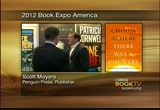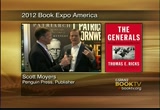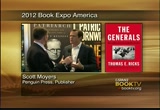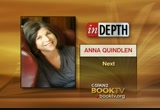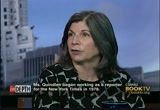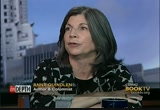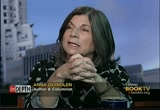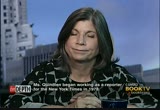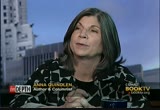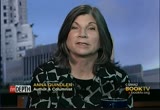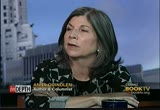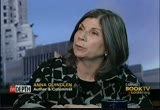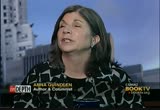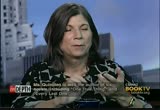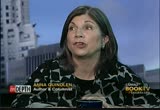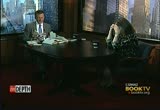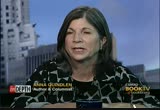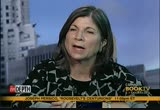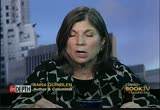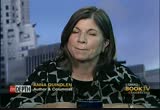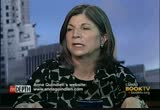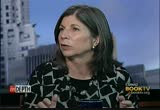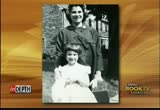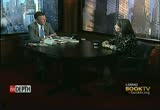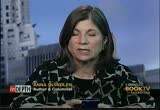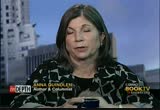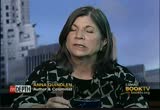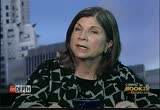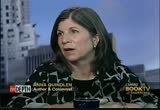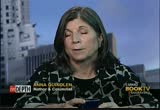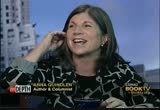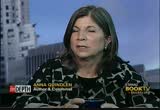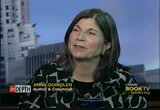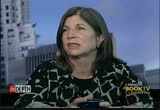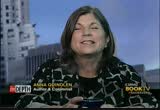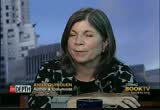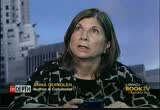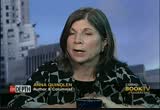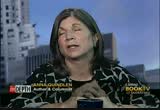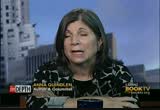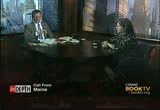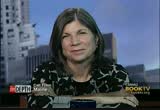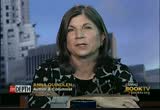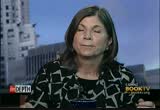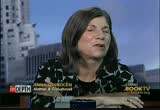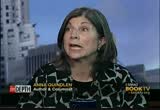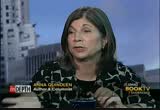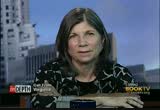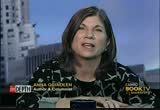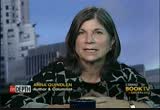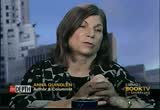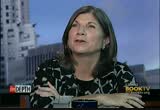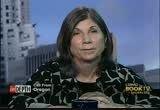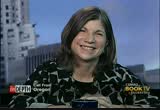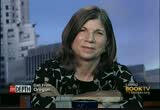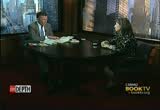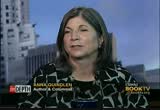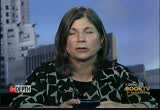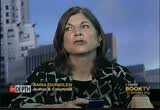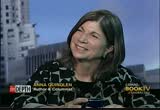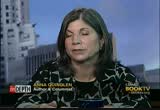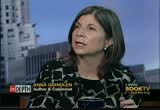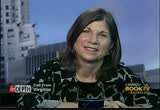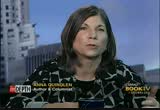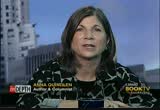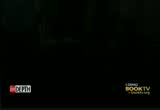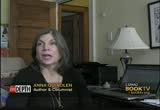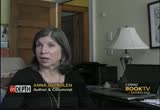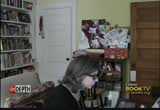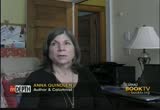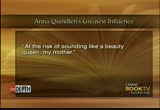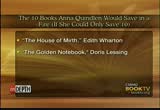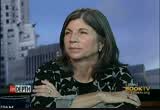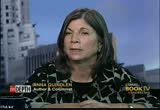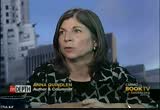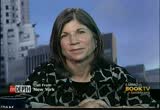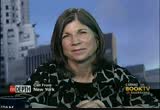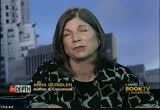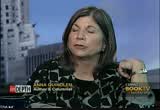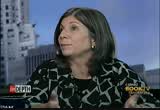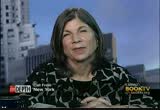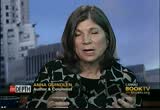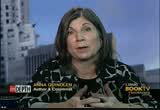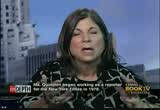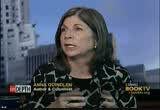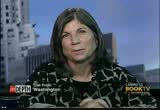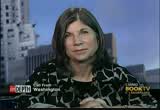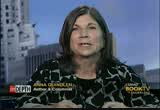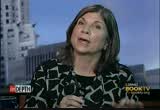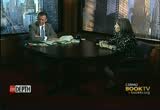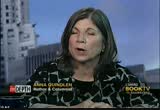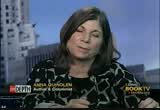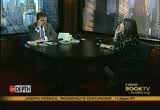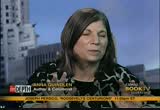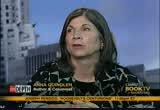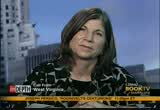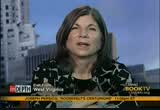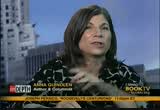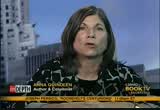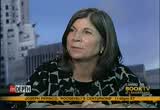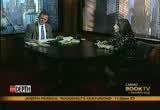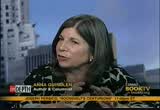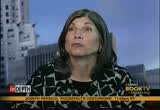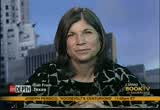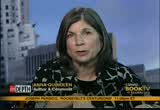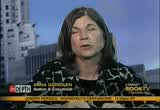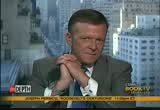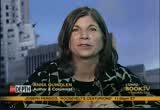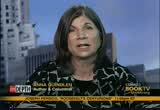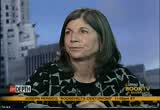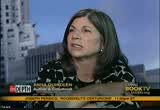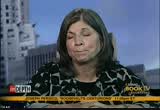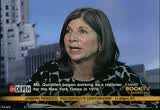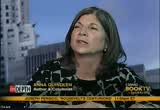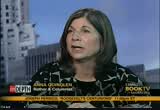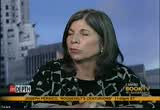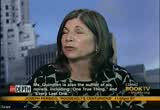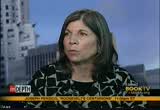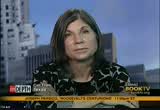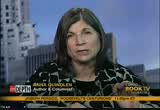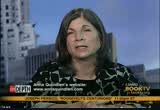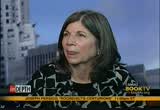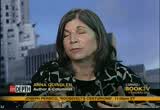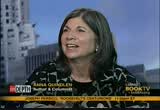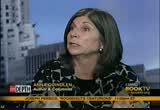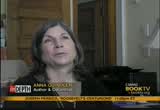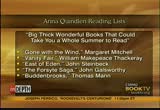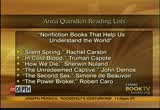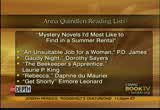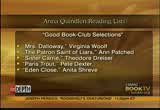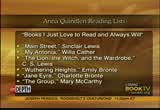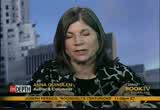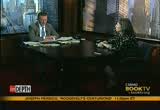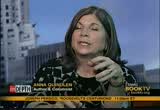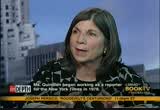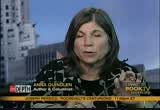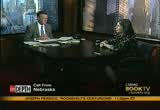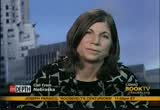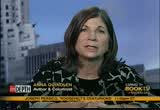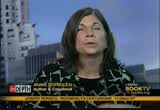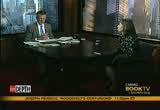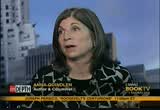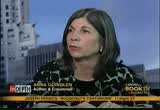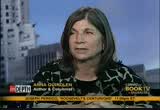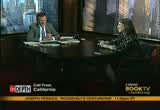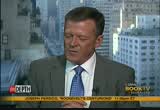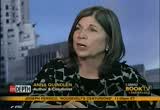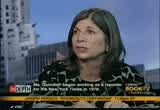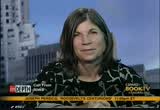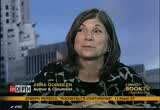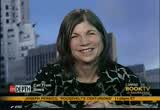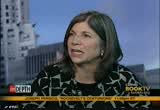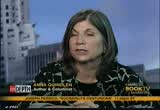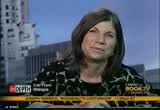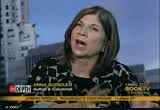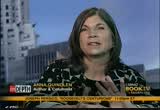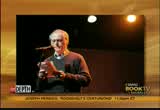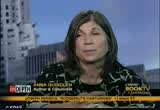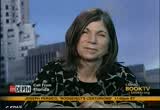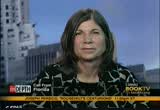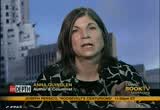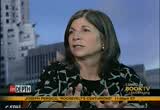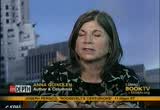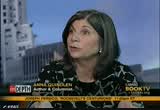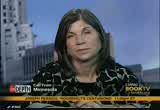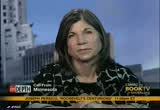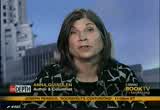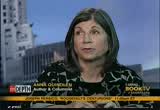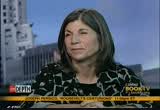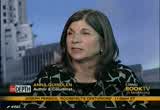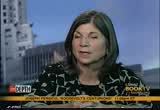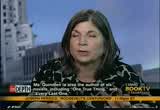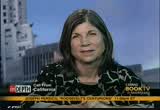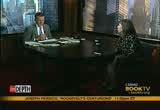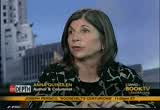tv Book TV In Depth CSPAN August 31, 2012 8:00pm-11:00pm EDT
8:00 pm
as ever and we are would be careful with his time. many people would like to do things the scholar of the publication of the book. we have to be careful and limited, but i think that -- i hope we will bring down the thunder and create a good sense about this book. >> finally a former "washington post" writer that is familiar to a lot of the viewers on c-span has another military book coming out
8:01 pm
which he said, you know, today in 2005, a private suffers more grief for losing a rifle than a general suffers for losing a war. and it's true, john reflected that being a general is really hard, and should be expected that many people fail at it. that command is famously hard. the american military had a tradition of firing general. there wasn't any shame in it. the military has completely lost the tradition. generals are essentially only fired by the president for political reasons now. tom wanted to understand what
8:02 pm
happened in the culture. he follows the generals all around the wars following the gene yolings and looking at what it is to be a general and why it is -- what's going to -- i can't read the whole part for you. this is a book we need as an institution to ask ourself about the questions about the leadership and how we hold our leadership accountable. and this is the book about how organizations need to hold themselves accountable for their performance, or else they stop becoming effective. it's a bock about the american military which is great military history. it's wonderful ramifications for anybody a leadership role anybody that works in an organization to improve or die basically. >> we've been talking with scoit moyers who is publish of penguin press. up next booktv in-depth
8:03 pm
the three-hour conversation with author and journalist anna qind less than. the pulitzer prize winning talking about -- she's author of ten non-fiction books including ""living out loud"" "being perfect qghts. and" lots of candles, plenty ofe cake." a memoir. >> host: what was your first job at "the new york times"? >> guest: i was a general assignment report which is what i wanted to be. po you go in in the morning, about 10/10:30. niewp hours meat me so happy, i'm not a morning person. you sit around and wait untilt somebodyun says quindlen, two bodies found a house of queens.. they have shut down kennedyght because of a bomb square. you get on the subway and take r a
8:04 pm
notebook and allow. i remember when i interviewed at the new york times when i was 24, i kept saying that. top editors would say, what do you want to do. i was taken by want to be a general assignment reporter. .. sure everyone eventually learned, i don't speak german. >> host: what was your path at the time. where else did you work? >> guest: i was a general assignment reporter for a number of years. it became clear to me that i was thought of as someone who was aa -- a turn of phrase. but not necessarily a serious na hard news reporter.
8:05 pm
and i realize that if i was going make my way through the paper, to where every, i was going to have convince them i goin could itg too. sked to go to ci, and i covered the first two years of the koch administration which was so much fun. and, um, and once i did that, i got a column called "about new york" which was started by mike berger in the '30s. it's the most fun because twice a week you do reporting on anything you want in new york city. and it's supposed to be written in a kind of a distinctive literary voice. and so that was a wonderful assignment. and then i became deputy metropolitan editor, a stint which was interrupted by not one, but two maternity leaves. and, um, when i came back, i realized that i was not going to be able to hold it together with two little boys under 2 and a newspaper job. and i quit, and that's the
8:06 pm
moment when, um, the executive editor, abe rosenthal, dreamed up a column called "life in the '30s," which i think for a lot of readers, certainly a lot of readers like me -- of a certain age, female -- put me on the map. and i did that for three years until maria was born and then became an op-ed page columnist for five years. >> host: who was charlotte curtis? >> guest: charlotte curtis was an editor at the times, she was a style section editor, and then she edited on the editorial page. and, um, when i first came to the paper, i think that she was the highest ranking woman and the first woman who'd opinion on the masthead -- who'd been on the masthead. she was very elegant looking. she always wore these skirt suits and beautiful jewelry and so on and so forth. and i think that those of us who were younger and thought of
8:07 pm
ourselves as more feminist, um, were a little contemptuous of her. we felt that she had gotten where she was by being one of the boys. um, and there were two things that changed my mind about that and changed my mind about being judgmental about women a generation older than i was. the first was that when i was made deputy metropolitan editor which made me the highest ranking woman in the newsroom, charlotte asked to take me out to lunch. and over lunch she said to me, remember, you'll only have as much power as they give you. and suddenly i saw her in a whole different light. i realized that she understood so much about how things worked at the times in the newsroom. and when i told my friend robin morgan who edited, um, the great anthology, the historic
8:08 pm
anthology of the feminist movement, "sisterhood is powerful," when i told robin that, robin told me that, in fact, charlotte had been in atlantic city when, um, a group of feminists in the late '60s disrupted the miss america pageant. they did not, in fact, burn their bras even though everyone thinks that they did, but they did disrupt the pageant. and charlotte had been covering that for the times, and all the feminists were jailed. and when they were busted out of jail, when they got bailed out, they discovered after the fact that it was, in fact, carefully coifed, carefully dressed, beautifully made-up charlotte curtis who had provided the bail money. >> host: why did you leave the editorial page? >> guest: um, i mean, let's get first principles off the table. i loved "the new york times" insanely. i love "the new york times" the way some people love, i don't know, the significant other in
8:09 pm
their life. i think it is now and has during my lifetime pretty much always been the newspaper of record. now it's not only the country's greatest newspaper, it's the country's greatest newspaper web site which i think is an amazing accomplishment. um, but i think it's a mistake to think that it's all there is to life. um, i started in new york city as a tabloid reporter at "the new york post" when it was owned by a woman named dorothy schiff. and i had the time of my life there. working for a tabloid is so much fun be, and it's forgiving. and the times is unforgiving because of what it is, because of who reads it. um, so i always thought that someday again i would have a life outside the times, and i also believed that most opinion columnists, most pundits stay too long. they stay to the point that
8:10 pm
readers open the paper in the morning and say, oh, that again. and i never wanted anyone to say, oh, that again about one of my columns. so i stayed just long enough to feel like i was pretty good at what i did, and then i left to be a novelist. and it, it's been a very happy confluence of crafts. >> host: anna quindlen, how long were you as "newsweek" writing columns? >> guest: for nine years, but that column was only every other week. the times' op-ed page, as most readers know, is two columns a week every week. and to have a column every other week really opens up more writing room for you. and in some ways it was a very, very happy, um, schedule because one week i would be working on a column which is wonderful because you can rely on the reporting and because when it's done, it's done. and then the next week i'd be
8:11 pm
working on a novel which is so challenging for me and opens up so many other, um, vistas in the terms of my writing but has the disadvantage of deferred gratification. i mean, you work on it for two or three years and veer wildly from thinking it's the best thing you've ever done to you've wasted your life. so to trade off between that and the columns was really, really nice. >> host: good afternoon, and welcome to booktv on c-span2. this is our monthly in-depth program. three hours with one author and his or her body of work. this month author, novelist, column writer anna quindlen is our guest for the next three hours. we're going to put the phone numbers up on the screen, we'll begin taking those calls in just a few minutes. you can also send us a tweet or an e-mail, booktv@cspan.org or a
8:12 pm
tweet @booktv, twitter.com or @booktv. anna quindlen is the author of several nonfiction books. beginning in "living out loud," 1988 that came out. "thinking out loud" came out in this 199 3, "how reading changed my life," 1998. a short guide to a happy life in 2000. loud and clear in 2004 and "imagined london," also in 2004. "being perfect" came out in 2005. "good dog, stay," came out in '007 and now we are hem worry is is -- her memoir is her latest. how many novels have you written? >> guest: i've written six, i'm working on my seventh. >> host: and do you prefer writing nonfiction or fiction? >> guest: i find writing fiction at this point in my career more challenging. i mean, i've been a reporter on and off since i was 18 years old and a columnist since i was 29. and while i love doing that kind
8:13 pm
of work, it doesn't push me at this point, um, quite the way novel writing does. >> host: in your memoir that just came out a couple weeks ago, "lots of candles, plenty of cake," you talk about feminism today, and you talk about gloria steinem, betty friedan and female impersonators. how do you feel about feminism today? >> guest: oh, great, it's so great. people will say to me, who's the next gloria? who's the next person writing the feminine mystique? and i have to keep saying over and over again, this is what happens to social movements when they're successful. they become absorbed by the culture. so the fact that, as i say in the book, my daughter maria who's now 23 once said to me, has a man ever been secretary of state, shows how radically the world has changed during my lifetime. because all she'd seen, she hadn't quite internalized colin powell, but she had madeleine
8:14 pm
albright, condoleezza rice and hillary clinton. so i think the expectations we have for our daughters and for women in the world have changed so much. is everything fixed? absolutely not. do we still have a long way to go? absolutely. is the world for my daughter a completely different world in certain ways than it was for me growing up? there's no doubt about it. >> host: what did you mean when you refer to gloria steinem's phrase, "female impersonators"? >> guest: i think when women are growing up, we get a lot of messages from the outside world. some intentional, some not so about how we're supposeed to be, about how we're supposed to fold our hands and be obedient and say certain things and not say others and look a certain way and be pleasers. i think that's really what gloria meant. and she will be the first to say
8:15 pm
that she was that girl, and, of course, i quote meryl streep who is so smart and so outspoken in, um, her commencement speech at barn ard college in 2010 saying that one of the roles she worked hardest on in her entire life was being that kind of pleasing, tractable girl in high school. it took, it took a brave young woman to say i'm not going to do that. i know exactly who i am, and i'm going to be that person be. so the rest of us, there was a pretty steep learning curve, and some of it consisted of behaving like women with whom we really didn't have very much in common. >> host: from "being perfect" let me be very clear, anna quindlen writes, about what i mean by that. i mean that i got up every day and tried to be perfect in every possible way. if there was a test to be taken, i had studied for it. if there was a paper to be
8:16 pm
written, it was done. i smiled at everyone in the hallways, and i made fun of them behind their backs because it was important to be witty. and i edited the newspaper and cheered at pep rallies and emoted for the literary magazine and rode on the back of a convertible at the homecoming game, and if anyone had stopped and asked me why i did those things, well, i'm not sure that i could have said why. but in hindsight i can say that i did them to be perfect in every possible way. >> guest: that about covers it. that's, that's sort of the zenith of female impersonation, i think. and there's a great joy in getting older because you outgrow that. you outgrow that need to be that girl. i will never forget that aversion of that -- a version of that book was the commencement speech i gave at mount holyoke whichs, of course, a women's college in massachusetts. and as i was saying those things i looked out at some of those
8:17 pm
women who were among the smartest and most capable of them in the country, and a number of them were weeping. and they were weeping because they recognized not their true self, but the self that they'd been pretending to be all those years. and afterwards a number of their mothers said i wish somebody had said that to me when i was younger, you know? women put a lot of pressure on themselves to do ask be -- to do and be a certain way, and the the great glory of aging is you get to a certain point and you think, no more. i'm done. >> host: do men face that same challenge? >> guest: i don't think so. i don't think they face it in the same way, although the pressure on men to look a certain way seems to have grown during, say, my kids' lifetime. i mean, i don't remember thinking twice about whether any guy i ever met had abs. i mean, what were abs? but i do think that that drum beat of how one ought to be is
8:18 pm
far stronger and more pernicious for young women than it is for young men. and what it means is that we're always backstopping ourselves, you know? not smart enough, not pretty enough, not dressed well enough, not accomplished enough, you know? there's this kind of drum beat of nay saying that i don't think that young men get in the same way. at the same time, in some ways that makes it harder when they get older, it seems to me. because while we finally examined all those internal voices of create is schism and said, no, no, no, i'm enough, i'm more than enough, the criticism starts for them when they get older. you know, that they haven't become the masters of the universe. that they're less in some ways than they once were physically, um, psychologically perhaps in the work world. and so i think in, i think that
8:19 pm
aging liberates women in a lot of ways, and i don't think it does the same for men. >> host: from "loud and clear," anna wind eleven writes: while we changed laws and institutions in the last 30 years, we sometimes did not change hearts and minds. and so both as a feminist and a mother of two sons, it has come to me slowly but surely that the part of the promise of the women's movement that i hope to see fulfilled in the 21st century is the liberation of men. >> guest: i still think that's true. i still, i mean, i hear all the time women come up to me and say, oh, you know, my son is taking a paternity leave, or he does so much with the children, and i'm always thrilled to hear that. but what i see over and over genre mains young women -- again remains young women who are really stymied about how to balance work and family and young men who think they balance work and family by getting
8:20 pm
married. and i really do feel as though the next frontier is in terms of an egalitarian domestic life. because one of the reasons why so many women take themselves out of the running for certain kinds of jobs is that they feel like they cannot square them with their life at home. and if that life were more evenly shared, i think that they would feel differently. >> host: what's the 20% rule when it comes to women? >> guest: terrible. um, the white house project which is part of the ms. foundation for women did a study and found that, well, we have all of these young women going into the professions, going into medicine, going into law, going into journalism. when you get to the top ranks, when you get to the leadership level, we've been stuck at somewhere between 10 and 20%. for years. for as many as 20 years. in government, in, um, in
8:21 pm
nonprofits even which don't even pay as well as they should given the great work that they do, in the law. and that level, that leadership lid seems not to budge. it seems very intractable. and what it means is that we fall down the ladder. i mean, as i say in the book, in terms of female political representation, we're behind iraq and north korea. so americans like to congratulate themselves all the time on we're number one on all these things. we're just not. you know, we're not doing very well on infant mortality, we're not doing very well on maternal mortality. obviously, we've talked so much about things like obesity and good health. but in terms of women leading, we really are not doing anywhere near as well as we should be doing. and we shouldn't be doing it not because it's fair or egalitarian. i mean, that was our early
8:22 pm
argument. we should have women in high places because that's a fairness principle. well, i believe in the fairness principle, but i also believe in pragmatism. if everything worked in america, if law firms were chugging along really well and hospitals were running like clockwork and congress was really doing a bang-up job, i would say, well, you know, things are pretty good. we need women in leadership positions because nobody is leading as well as they should be. and if we're ignoring a big chunk of the population, maybe that accounts for why the leadership is not as good as it ought to be. >> host: anna quindlen, where'd you grow up? >> guest: i grew up outside of philadelphia in a suburb called drexel hill. >> host: what'd your parents do? >> guest: my father was a management consultant, and my mother was, how do i -- my mother was a housewife. my mother was, like, every other mother i knew. all the women i knew growing up
8:23 pm
were either housewives or nuns except for my aunt katherine who was an executive secretary. which meant that she ran everything at her place of business. >> host: so would you say that you grew up in a white world, upper middle class? is. >> guest: oh, my gosh, yes. i mean, i'm trying to remember the first time i ever even met anyone who was black. you know, i can't remember exactly, but i grew up in a white world, in if a catholic world, in an overwhelmingly irish world and in a privileged world. there's no question about it. and i had a very happy childhood. i sometimes say that was, you know, that's my cross to bear as a writer. all those wonderful stories that show up in memoirs about hideous childhoods, i don't have any of those really. >> host: so when "lots of candles, plenty of cake" in the book jacket it describes you as
8:24 pm
the laureate of everyday life. is that an upper middle class white life? >> guest: i don't think there can be any question about that. i mean, everyone's with this book someone said to me, well, you know, you are a prosperous woman from an educated background, and can i go, yeah. that's the story i have to tell. now, as a columnist i would put my record on afflicting the comfortable and comforting the afflicted up against anyone's, and be certainly homelessness and poverty and need in this country were always at the top of my agenda over and over again when i wrote columns. but when you're writing a book about aging and how you feel about aging from your own personal point of view given the kind of background i have, the kind of life i lead, it's inevitable that people who are needier or who have grown up in much more difficult circumstances than i have might feel like i'm not speaking to them. what happened when you were 19
8:25 pm
years old, and how did that change you? >> host: my mother -- >> guest: my mother died when i was 19. she had stage iv ovarian cancer which as it tends to do was diagnosed quite late in the game which meant that there was really no possibility that she was going to survive. and during the last, um, five months of her life, um, i left college and came home and took care of her, and then after she died i, um, was a working mother of four children who happened to be my siblings. and, um, it was a pretty horrible situation. they didn't like it much, i didn't like it much. um, and it completely changed me. i mean, there's something about, first of all, there's something about watching, um, someone die by inches that as anyone watching who has done that knows is usually transformative. second of all, there's something
8:26 pm
about watching someone hang on that makes you realize how absolutely wonderful living and life is. and, um, and then there was something about, um, you know, being out of school and having to live this suburban life taking care of my siblings that was was terrifying and seemed to me like a cautionary tale and drove me away from any possibility of ever having that kind of life for at least ten years. >> host: anna wind eleven, we always ask our guests what their favorite books are, what books they're reading, etc., but on top of that in your book "how reading changed my life," you have some books in here that you would save in a fire, etc., etc. and one of those books that you think everybody should read that's been important to you is "courtney's complaint." what's the history of you and "courtney's complaint"?
8:27 pm
>> guest: courtney's complaint had a huge effect on me. to begin with, i first encountered it when my mother got it from the book of the month club. she used to get a book from the book of the month club every month. and i can't remember how far into it she was, but she tossed it across the room and said, um, something like this is a filthy book, or this is a dirty book. um, and in retrospect i keep thinking now how did she expect a kind of hyperverbal, hyperliterary kid of a certain age to respond to that? i immediately grabbed the book and read it myself, and one of the things that i think was hugely liberating for me was that i had read mainly in the 19th century when i had been reading adult books. i'm a huge dickens fan. i got onto that pretty early. and it was liberating to me to
8:28 pm
know that you could write in this kind of vernacular. i mean, the book is written, written with a very strong, um, not slangy voice, but not formal voice, very conversational, very flip pant in -- flippant in places. it does have this attitude about sex which, of course, i found completely eye-opening, but also very liberating. it taught me something about modern literature at one fell swoop that i really needed to learn about, um, untying the kind of ties that bound the novelists of the 19th century. um, and opened up to me an entirely different way of writing which was invaluable. and i still think, i mean, i gave it, i gave it to my sons who were, are really, really inveterate readers as is maria, of course, and i gave it to my
8:29 pm
oldest son who is extremely well read and was very, very verbal, um, when he was 13, i think it was. because i think sometimes when you're a 13 or 14-year-old boy, you feel like, first of all, like you can't walk down the street without thinking about sex. and that that's this weird aberrational thing, and nobody else is doing the same when, in fact, every other 13-year-old boy is doing the same. and i thought it would do that thing for him that reading is supposed to do for all of us. it would make him feel less alone. it would make him feel as though he wasn't an aberration. and, in fact, that's exactly what it did, and he really loved it, and i think a lot of the other mothers at school thought i was completely nuts for doing that. >> host: where did your novel "black and blue," where did the idea for that come from? >> guest: um, "black and blue" actually started as most of my novels do, in a thematic way.
8:30 pm
um, i'm often struck by the fact that women identify themselves, see themselves as kind of the sum total of all the people that they love or that love them. so that if you ask a woman about herself, she'll say, well, i've been married 20 years, and i have three children, and i grew up in and my mother was, these kind of intimate relationships. and i thought what would it be like if you were a woman who was stripped of all that, if you lost all that emotional property as it were? and over time i realized that the only thing that would really work was to have a woman who had to flee her former life. and i started to think about reasons why someone would do that, you know, in the middle of a war if you were a refugee, but the one that seemed to be most rez in a minute and most possible for -- resonant and
8:31 pm
most possible for me was a woman who was being beaten up by her husband and was trying to flee him, and that's how the domestic violence aspect of "black and blue" began. >> host: who's jerry? >> guest: my husband. [laughter] there's only one jerry in the world. [laughter] >> host: how long have you been married? >> guest: 34 years. >> host: and what kind of work does he do? >> guest: he's a trial lawyer. he does a lot of criminal defense work, and he also does some civil work. >> host: in "lots of candle les, plenty of cake," you write that your finances are separate. >> guest: they are. >> host: 34 years later. >> guest: they are. you know, maybe it's because i read for so many years that the biggest fights in marriages, um, are about money, and maybe it's because, um, i like to buy things that i know that he'll think are nuts. i mean, you know, i never wanted someone saying to me how can a sweater cost $700? that's a good question, but i never wanted someone else saying it to me.
8:32 pm
so it's worked really well to split things sort of right down the middle for us. >> host: and in that book you write: if a marriage is to endure over time, it has to be because both people within it have tacitly acknowledged something that young lovers might find preposterous. it's bigger and more important than both of us. >> guest: it's true. i mean, i think -- i thought so much while i was writing that chapter about marriage and about my friends who were long married. and dating is such a poor preparation for marriage. i mean, it's like, oh, i don't know, it's like eating dessert first. i mean, you know, sometimes you should eat dessert first, i guess, but then it sort of headaches the main course seem -- makes the main course seem a little if not good, at
8:33 pm
least so different. and even cohabiting, you know, i think that we came up with that because we realized dating didn't prepare people for marriage. but each cohabitation -- even cohabitation doesn't prepare you for the fact that that person is going to become your family. they're actually your only freely-chosen family member. unless you're adopted, you're related to your parent bees by blood -- your parents by blood and your siblings, of course, and obviously your children. but your husband or your wife or your spouse is a person where you've freely chosen to headache them not only a -- to make them not only a part of your family, but the bedrock of your family. that's so unromantic at some level, being family. i mean, there's this anecdote at the beginning of that chapter that i think says it all. i was at nantucket cottage hospital with our friend david
8:34 pm
hall very stamm because jerry had gotten a bad clam at the clam's shack. actually, last month's guest on this program, tom brokaw, was with us too, but jerry was the only one who got the bad clam, and he was really sick. and the nurse came out and said are either of you related to him, and we both shook our heads, no. in my defense, we'd only been married about five months, i guess. um, and then when david looked at me quizzically, i said, oh, well, i'm his wife. and be so nothing could be further from related to. but i think that's what it takes us a while to realize when we get married, that suddenly it's family, it's history, it is bigger than both of us. and that requires you to step up your game. >> host: you reveal in "lots of candles, plenty of cake" that when you were in your 20s you went to the doctor to have your so-called tubes tied. >> guest: right. well, i had been taking care of
8:35 pm
my siblings at the worst possible time in their life and the worst possible time in mine. and i drew some conclusions about motherhood from that experience which, obviously, i shouldn't have drawn. i was very, very negative about it. um, i think there are people who have very good reasons for not wanting to ever have children. um, but mine wasn't such a good reason, and, um, my friendly doctor suggested that i might want to, um, talk to someone about why i felt so strongly about this, and i didn't want to talk to anyone, and i just let the time pass by, and then when i was 30 i suddenly changed my mind. >> host: you also mention, though, that the doctor was smoking a cigarette while he was telling you this. >> guest: that's how you can tell how old you are. jerry has these memories of their pediatrician with a cigarette stuck in the corner of his mouth listening to their heart while ash fell down on them. [laughter]
8:36 pm
that's definitely a measure of how old you are. >> host: you also mention here that you don't drink. >> guest: i do not drink. i haven't had anything to drink for 23 years. >> host: why? >> guest: um, i think the short and simple answer would be that i'm a recovering alcoholic. even a recovered alcoholic. i'm sorry, i don't want everyone at aa to be mad at me, but i can't imagine circumstances in which i'd ever have a drink again. i tend to be an all or nothing person, and at the moment i decided i probably shouldn't drink, i sort of decided that i never would. >> host: did you find yourself on a trajectory? >> guest: i don't know if i'd say that exactly. um, you know, my agent said, um, this is the most boring chapter about alcoholism i've ever read. she has some, she has some very vivid memoirist who had much worse experiences. and there was the suggestion that maybe i might just want to lose that chapter. but the truth of the matter is i
8:37 pm
think the world is filled with women who say to themselves every once in a while, boy, i'm drinking more than i should. not, gee, i got popped for a dwi or, you know, i fell down at parents' night at school or nothing, nothing really terrible like that, just this nagging sense that maybe, you know, you shouldn't have had that fourth grass of wine -- glass of wine. and i think if you start to think that way, it's probably the better part of valor given the fact that nobody really needs to have alcohol. i mean, it doesn't provide nutrients that you desperately need, to stop. especially if you have little kids, and i did, so i did. >> host: is that the first time you've ever written about alcoholism? >> guest: it is. it is the first time i've ever written about it. i wrote about it at length, oh,
8:38 pm
maybe six or seven years in, and it turned out that i had a family member who really didn't like the idea of me being public about this. and my, my attitude has always been if it's family versus prose, family always wins. and so i killed the piece that i wrote at that time. but after all this time it turned out that, um, that there was no longer think issue, and so i went ahead with it. >> host: do you attend meetings? aa meetings? >> guest: no, i don't. i've never done aa. i kept telling myself that if i felt like i needed to, i would. and i certainly think the first year after i stopped drinking i was what in aa they call a sober drunk which means somebody who's not drinking but still hasn't really thought enough about why they drank in the first place. and then over time i spent a lot of time thinking about, you know, why people drink and why i
8:39 pm
hadn't, so on and so forth. and, um, and i just really didn't feel the need to go to meetings. i felt really comfortable not drinking, i didn't feel like i was in any danger of changing that. i know that's kind of -- some people in aa would argue that if you didn't feel the need to go to meetings and you don't feel challenged in your sobriety, that means you really weren't an alcoholic to begin with. who knows, who cares? i put down a beer 23 years ago and said i'm never going to drink again. that's what i did. >> host: and finally, anna quindlen, before we go to calls, the friend of mine when she found out that you were going to be on, she stated that she quit going to mass because of anna quindlen. and that was a good thing in her view. what is she referring to? >> guest: um, it's got to be something that she read in this book, i would imagine, because the truth is i didn't quit going to mass until a couple of years ago. i wrote any number of columns
8:40 pm
about the shortcomings of the catholic hierarchy over my time both at "the new york times" and at "newsweek." they were none too pleased with that. i got disinvited from catholic institutions because they didn't want me speaking there. um, but i hung in there until -- i'm not -- i think it was about two and a half or three years ago. and between the way the church has handled its relationship with its female members and the way they handled the aftermath of the, um, of the sex abuse scandals which came out in drips and drops and then in a torrent over our lifetime, i just began to feel that showing up in the pews on sunday ratified their leadership. and i couldn't ratify it because i think it's really bankrupt. and so i stopped going to church. and, you know, i said that at an
8:41 pm
event, and the audience burst into applause, and i said, no, no, no, no, this is not something to applaud about. this is a source of pain for me, it's certainly a source of pain for some members of my family. you know, i only wish the catholic church was as good as the guy in the new testament who started the whole deal. but it's not, and i don't want to send the message anymore that it is. >> host: anna quindlen is our guest this month on "in depth." the area code is 202-737-0001 if you live in the east and central time zones, 737-0002 for those of you in the mountain and pacific tame zones. e-mail or send a tweet, twitter.com/booktv. and we're going to begin with a call from belgrade lakes, maine, and martha's on the line. hi, martha. >> caller: oh, hi, peter. thank you for c-span, as usual. >> host: well, thanks for holding. you're on with anna quindlen.
8:42 pm
>> caller: um, anna, um, i raced home from church -- not from mass, but i raced home from church to hear you today for three hours. [laughter] >> guest: well, thank you so much. >> caller: i might have missed this, but i must say i was attracted to your writing from your newspaper columns and then from there our book group in charleston, south carolina, read "blessings." i hope i have the right author and the right book. is that correct? >> guest: yes, absolutely. that's my fourth novel. >> caller: well, my retirement community down there which ranges in the age from 55 young to 110, we all loved it. and when i was in -- you talk about aging, i mean, now that i'm old i'm really enjoying life, and in paris when i got so tired i had to sit down and read, i bought your book in
8:43 pm
paris, "rise and shine." is that correct? >> guest: yes. >> caller: well, "rise and shine" my mom would always say that in the morning when we had to get up for breakfast. and i was wondering if "rise and shine" is autobiographical at all with anything about sisters? because i bought the book for my sister, and be i read it in paris when i was so tired. >> host: all right, martha, thank you very much. anna quindlen. >> guest: well, i do have a younger sister. i think sometimes there have been odd little moments, um, for her in being my sister. given the fact that in certain circles i'm relatively well known. but in the same way that one true thing is not about me and my mother and father, um, because the characters are so different from the each of us, megan and her sister bridget are
8:44 pm
quite different from my sister teresa and i. i would say the one thing they do have in common is bridget is a social worker, a social worker once said to me no one ever puts us in books. and i said, well, now someone has. and my sister is actually a public school history teacher which along with being a social worker i consider the work of the angels. so to that extent, um, there is some autobiographical connection, and i do know about sisters, but i would say megan and bridget are quite different from ann ma and teresa. >> host: tina cassidy tweets in, how has writing changed for you over time? >> guest: oh, i wish i could say it's gotten easier. but it hasn't. um, you know, writing is a process of judgment. it is, it's not been uncommon during, um, my time as a book
8:45 pm
writer to be sitting at a table like this one with a huge tack of my books -- stack of my books in front of me in a bookstore getting ready to sign, and someone comes over, picks up the book, reads the flap copy, closes the book, puts it back down and walks away. now, there is no clearer message that you are not wanted than that moment. and i think that, you know, you're always sitting there at the computer thinking i have this idea in my head, and as it was in my head and beginning to form, it felt perfect, and the words and the characters, it all seemed to fall into place. and now here i am in front of a blank computer screen, and somehow it's not falling into place anymore. so, i mean, i suppose i have somewhat greater facility in the reporting part of it. in fact, i know i have greater facility in the reporting part of it, but the writing part of it i still find incredibly
8:46 pm
challenging. >> host: well, tracy ewens e-mails in to you: after all your success and achievements, do reviews still matter, and does a bad review -- if you've ever received one of those -- still sting? >> guest: if i've ever received one of those? um, i made a decision about i can't remember when "rise and shine" came out, but maybe it was eight or nine years ago, i made the decision to stop reading reviews. um -- >> host: 2006. >> guest: 2006. that was the first book. "rise and shine" was the first book for which i did not read any of the reviews. i found that i didn't learn anything from them. there were two very teacherly reviews over the years that i was deeply grateful for be. one was from the wonderful novelist anne tyler who, of course, had no bone bones to make on my back so could afford to be generous and teacherly and
8:47 pm
taught me something about how i do what i do in terms of her criticisms. and one was from maury corrigan who i believe is still at georgetown and does work for npr about "black and blue" which was a book that, which was a review that opened the book up for me in ways that i hadn't quite appreciated. it's wonderful to read things about your own work that hadn't occurred to you and think, oh, my goodness, that's true. but the rest of them often tended more often to review me than to review the book. and, um, and i didn't like negative reviews. so i stopped reading them, and the deal is my closest friend happens to be a book reviewer. and so if there's one that she thinks i should know about because she thinks it's particularly telling or positive, she will tell me about it. and that's, that's how it goes. so i have not read any of the
8:48 pm
reviews of this book at all. >> host: is that janet or susan? >> guest: janet. >> host: is that her real name or -- >> guest: oh, yeah, janet's her real name. in fact, there was a lot of speculation on the blogosphere that it was a mystery novelist, janet e van slip, whose work i find be infinitely entertaining but whom i've never met and is not my friend. >> host: next call comes from karen in arlington, virginia. good afternoon, karen. >> caller: good afternoon. i just wanted to, first, thank anna quindlen. i always used to, used to be the first column i would look at in the paper, and um i really miss you at "the new york times." and, um, you probably had some sort of influence in my decision to go into social policy work. so thank you very much. um, i want to ask, um, what you think of, um, your female successors at "the new york times" op-ed page and, also, if you had a column to write for "the new york times"es today
8:49 pm
about the presidential election what you'd write. >> guest: well, the second part of that is an interesting question because it doesn't quite work like that. um, there's an on/off switch to being a columnist. and the on part requires you to really think about the world differently 24/7 than civilians do. in other words, you're always saving string. you see something on the street, you hear something on the subway, you read something in the paper, and it all becomes grist for this ever-churning mill of writing a column. so the truth of the matter is i couldn't sit down tomorrow and write the kind of column i would want to write about the presidential election because i haven't been saving that string since 2009, since i left "newsweek." and i know that all of my former colleagues have been. i know that they've been -- i
8:50 pm
know gail collins is thinking about the world every day in a way that i have not done for a couple of years. i have to tell you, that's kind of soothing. there's something about having to internalize everything that can get kind of exhausting, and i remember i think it was in 2010 that one of my kids wandered in during the state of the union and said i've never seen you watch this speech when you weren't taking notes. and for the first time in many years, i didn't have to take notes about what was going on among the members of congress while the president was talking. so, um, i'm not sure what i would say, but i would really have to get much more up to speed, um, in terms of my thought processes than i am now as a civilian. and i'm sure you can anticipate,
8:51 pm
first of all, there are not enough female columnists at "the new york times" yet. there should be at least three and probably four. um, the two that there are are both friends of mine. the two that there are are both fantastic writers, and, um, i'm just glad to know them and to read them. >> host: gail collins and mauer lean dowd -- maureen dowd, right? >> guest: right. >> host: maureen dowd writes: the president who started off with such dazzle now seems incapable of stimulating either the economy or the voters. >> guest: i think it's way too soon to say that about the voters. i think at some level, um, he has not yet begun to fight and that after the convention we will -- at the convention and then afterwards we will once more see the crackerjack come painer -- campaigner that we all know barack obama can be. but, look, i think it was mario
8:52 pm
cuomo -- although maybe he was quoting somebody else -- who said that you campaign in poetry, and you govern in prose. there's no question that the president has been governing in the prose in the part because -- in part because, um f he says white, the republicans say black or vice versa. and, um, i think it's been frustrating for those of us who hoped that there would be some level of major change. having said that, what is it joe biden says at fundraisers? general motors is alive, and saddam hussein is dead. and he thinks that should be good enough for the american people, and if i were a wagering woman, i would say that it willl be. >> host: have you ever voted for a republican? >> guest: yes. mil sent fenwick in new jersey who was running -- [laughter] who was running, i think, in a primary.
8:53 pm
that's the only time i voted for a republican -- >> host: the little pipe. >> guest: yeah. she was really a piece of work. and if i lived in maine, i certainly think i would have voted for olympia snowe. i think one of the saddest turns of events in the last year politically has been that a senator as dedicated, as smart, as hard working and as long-serving as senator snowe feels that things are so broken in washington that she can no longer continue. that broke my heart. >> host: sandra in bedford, oregon, you're on booktv on c-span2 with anna quindlen. >> caller: yes, thank you. >> host: please, go ahead. >> caller: hello, anna. i feel like i know you already. i'm just a tad older, maybe a big tad like a tadpole growing into a fish. i have many questions for you.
8:54 pm
as i said earlier, i feel as though i know you already. your sister may be a younger sister, definitely younger, because i'm 78. and i've been retired since the age of 65. but i'm not really retiring. i was born in modesto, california, but i'm not very modest either. in any case, i am a great admirer of yours and of the likes of you and your writing, and all of my inspirations prior to being exposed to you was in my grandmother who was without a doubt the biggest fan of myself. and she taught me everything literally. she was without prejudice except she did not believe in religions because there were too many religious people in her family. there were jews which is, yeah, jews and italian catholics and
8:55 pm
etc., etc., scottish because her maiden name was mccumber. and it goes on and on. and they came, the mccumbers and the brights that crossed from ohio and iowa in covered wagons after the war on the 25 bucks per annum that each of the families got and landed in modesto, california, and built, planted citrus groves and pear trees and all those things. and they built the first ferry on the san joaquin river which still exists, i'm told -- >> host: sandra, if you could, bring this to a conclusion. >> caller: um, just thanks for existing. my first emancipated performance was as a bank, was at the bank of america as a bookkeeper. and i was exposed to a assistant manager who was making time with
8:56 pm
the women in the vault. i reported it to the bank manager whose name was mr. brown, and we got him fired, or he was quitting. he did have to apologize both verbally and in writing. that's the end of my story for now. thanks. >> host: all right, sandra, thank you for calling in. >> guest: i'll tell you, making time with the women in the vault. i mean, every time you work as a fiction writer, all you can think of is anything i can make up can't have happened in the real world. i think i'm going to think about making time in the vault for a long time. >> host: you write in "lots of candles, plenty of cake," when we looked a at the women who had preceded us in law or business or education or most other fields, we realized that they had been engaged in an essential dance of gender and status. there was scorn attached to this. once it was safe to be female, employed and ambitious, one of
8:57 pm
of our older colleagues was passing, another had prospered by being one of the boys. >> guest: i think early days i'm ashamed to say that we did to -- do that. you know, there was -- i won't use the word contempt, but we dismissed the lives our mothers had had if they were housewiveses, and when we knew older women in the workplace, there was always a sense that they weren't quite out there enough or a lot of them weren't. and as you get older and wiser and you look back on the lives those women lead, you're astonished by what they managed to do under difficult circumstances, under incredible pushback. and you're astonished by what all those housewiveses were able to do as well. i mean, i remember looking at my mother and thinking, well, what does she do all day? well, she had five children under the age of 10 and almost none of the labor-saving devices that we have now. so she did a whole heck of a lot
8:58 pm
during, um, the course of any day. and i think one of the things that this book made me do was to meditate on those women and to no longer discount them, but to realize that they grew up in a world that was very different, um, than the one, um, the second wave feminism managed to make for women like me. and, but many of them would have had it differentthey could have. but they couldn't have, and it's -- the idea of passing judgment on that now that i'm almost 60 seems to me not only preposterous, but almost immoral. >> host: who is maxine smiley? >> guest: well, mrs. smiley. oh, this is great. if any of you know out there know mrs. smiley, call in and talk about how great she was. she lived next door to our country house in pennsylvania. and be she was the kind of person -- perhaps like our last
8:59 pm
caller -- about whom people will say she's a real character. she was one of the earliest flight attendants in the history of flight. she used to talk to me about how she was a flight attendant on planes that would go cross country but make five stops along the way. um, she was a nurse which is what you had to be to be a flight attendant at that early stage. um, and then she married walt smiley and settled down on smiley lane next door to us, and, um, she just was a very strong-willed, smart, acerbic woman who happened to forge a firm friendship with my then-4-year-old daughter. who when she was in sixth grade had to write, um, an essay about, um, her very best friend and wrote an essay about mrs. smiley. and she just was a complete joy to know because i think probably she got me started on that road of thinking twice about how i
9:00 pm
thought of some of the women who had gone before us out in the world. >> host: and then there's a story about maria telling her the dangers of smoking -- >> guest: yeah, yeah. >> host: while mrs. smiley was smoking? >> guest: yeah. mrs. smiley smoked up until the last day of her life. >> host: how old was she when she died? >> guest: i think she was in her late 70s when she died. too soon for my taste, frankly. but, um, but mrs. smiley would say to her, you know, if you're going to do that, you can go home. she was forever tossing maria out because she would just get tired of her, you know? [laughter] and say, no, you can't do that, you have to leave now. they had the best friendship because, you know, mrs. smiley was, as i said, a real pip, and maria is a pip in training. someday she will be an excellent pip, and she will have most of what she knows handed down to her from mrs. smiley.
9:01 pm
>> host: were you a helicopter parent or are you a helicopter parent? >> guest: i'd like to think i was not a helicopter parent. um, because i mainly see the downside to helicopter parenting. i think it really can cripple your kids. if there's nothing that they've ever done on their own, um, without someone telling them how to proceed, then they don't learn how to do things on their own without telling, without being told how to proceed. and the other thing is i think it makes it impossible for you to take real pleasure in your own accomplishments. you know, if you do, if you do an art project and your mother really is doing 80% of the art project and you get an a, do you say, wow, i got an a on my art project, or is there part of you that's saying, i didn't really do this? i think it's the latter. and one of the reasons i like to think that our kids who are not
9:02 pm
kids, who are adults now are mature people who are very easy about transacting successfully in the world is because at a certain point -- now, don't, i should not get the credit for this. it's not like i said i shouldn't hover, i shouldn't make the call to the teacher. at a certain point, each of them said, mom, no. you're not going to read the essay. you're not going to talk to the teacher. i would get a certain look on my face, and maria would say, do not call anyone. i thought that one of the smartest things i ever saw about this came to us when we took maria to ken oncollege which is where she got her bachelor's degree -- >> host: in ohio. >> guest: yes. and the dean gave each parent a card, and it said how are you going to handle that problem? and she suggested we put it by the phone, and when our kid called to complain about anything from course selection to the roommate to the food, we
9:03 pm
should read that sentence to them with the emphasis on the word "you." and it was really, really smart because as a college, um, officionado myself -- i was for some years the chair of the board at barn forward which is where i went to college -- i would hear constant stories about parents calling, you know, she got a b on that paper, and it's really an a paper. and i'm thinking, no, no, no, no, no, this is a grown person. she does not need someone else pleading her case for a better grade, and by the way, why are you reading the paper? so i would like to think i was not that parent, and i would like to think that that's why my kids are as mature and capable as they are. ..
9:04 pm
and quite frankly, i think you are the quintessential. do you realize how many times in the past hour it has been iowa, me, mine, am i in houston your questions asked, what ever? and then the other thing i would like to bring up is -- karni --> when you said that you had left the editorial page was the say that was this a backhanded m insult to maureen dowd who has t i th there forever? >> guest: that wasn't any has reflection on maureen a person we not when she feels her well has
9:05 pm
run dry, but when she's still at the top of her game. that's how i feel about it. every columnist has to gaming for themselves when that time has come, and i think you sort of nailed that. i am a feminist. i feel feminism completely changed my life and world for the better, and while anyone reading my columns would know i use the word with "we" more thay writer out there. when i talk about my own point of view and life history, i have to be some part of it, but i'm happy to call myself a feminist. i like to use the word as well because i think one of the reasons people backedded off from it a little bit is because it's been co-oped by people who are opposed to women's rights and who have tried to make it
9:06 pm
sound like something that's it's not. feminism is just the process of valuing people based on their abilities and not based on their gender, but because we started with a system in which women were routinely discounted from a-z, what that's often meant is opening up opportunities, venues, institutions for women, and i think that's all for the good. i mean, i think about a society, say 50 years ago in which it would have been impossible for hillary clinton to be secretary of state or to run for president. i'm much happier with the society i live in today. >> host: one hour gone in the three hour conversation with anna quindlin, and as we do here, we visited anna in her house in new york city to learn about the writes process.
9:07 pm
here's a little bit of that video. >> i would say that i'm working from 9-3. most writers who say they write for seven to eight hours a day with exaggerating. you just can't. you sort of lose it after awhile. you certainly lose it when you're working on a novel because the edges of your imagination starts to wear after, i would say, best case, about three hours. even when you write a non-fiction book, you know, it may be three good hours of pounding away, and the rest is research, e-mails, making another cup of coffee, that sort of thing. fiction usually begins with a theme for me.
9:08 pm
identity, redemption, art, fame -- things like that. the whole process picks up steam when i start to ground some of my thoughts in a character who will become the protagonist, than character becomes sharper and sharper to me. i think all writing is affirmatively good if only because it leaves a piece of yourself behind. let's say you are blogging all through your 20s, and almost no run reads your blog, but 20 years from then, you'll have children, and you can she them -- show them what you wrote, and they'll understand things about you they wouldn't have otherwise. writing the most basic form of writing, a letter, a poem, a note to someone, it produces immortality. we had that experience of loving someone, of losing them, of opening a drawer and finding a card they've signed or a letter
9:09 pm
they wrote and think, still alive, still alive in some way so i think the more writing, the better. [inaudible] you know, i think regrets that a good columnist, and i like to think i was a good columnist, gets out before she publishes. in other words, you spent a fair amount of time at the computer backstopping yourself. when you are writing about your family constantly, and even writing about events, part of your brain is thinking how will this feel in ten years? how unequivocal do i want to be about certain things? i think you do a lot of -- i wouldn't at all call it censoring. it's more taking the long view.
9:10 pm
because of that, i don't really have any regrets about anything i've written. >> any advice for writers? >> yeah, i mean, don't wait for inspiration. i don't know where she is, but she's not coming. or at least she's never coming here. i never see her. occasionally, there's fleeting fly-byes, and then she's gone again and then it's about hard work. the hard work part does not largely consistent of thinking about it. people say toe me all the time no book gets written by thinking about it. at a certain point, you have to sit down and sit down whether you feel like it or not. too often, people think that if you're going to write well, it must be because you wake up in the morning, and your heart sings. my heart doesn't sing because i
9:11 pm
9:13 pm
>> host: we're live back in studio, and this is "in depth," and we have two hours left in the show. if you live in the east and central time zone, 202-737-0002 #. we'll put up the e-mail and twitter address. anna quindlen, in your book, "living out loud," you say you don't feel all one way about abortion anymore, and if i don't think it serves for the just cause that many of us do. for years, i believed a woman's right to choose was absolute, but now a wonder. do i, with a stable home, marriage, sufficient stamina and money, have the freedom to choose abortion because a
9:14 pm
pregnancy is inconvenient right now? legally, i do have the right. legally, i want always to have that right. it is the morality of exercising under those circumstances that makes me wonder. >> guest: yeah. the international issue, that ones that seems to be going nowhere in terms of a public conversation. what that observation comes down to is what it always comes down to. this is a personal, intimate issue. i do not believe that the men i have met in washington in albany or sacramento have any business having jurisdiction over the pelvis of the american women. they don't have the authority to do it. this is 5 matter of deep, deep conscious. i understand people who are troubled by it. i also understand people who say
9:15 pm
this is the only recourse i felt was open to me, and i think the important thing to remember is this is not between legal abortion and no abortion. this is the decision about whether we're going to have a legal abortion or illegal abortion, and we all know where that ends. we all know when abortion is put against the law, hundreds of thousands of women have nevertheless terminated preeing nan -- pregnancies by any means, some quite dangerous. one of the most transformative moments i had on the issue doing a column called "abortion orphans," and i sat with a group of grown women in their 50s and 60s, all who have grown up motherless because their mothers had illegal abortions from which they died, and i thought i do not want to create anymore
9:16 pm
abortion orphans, and the way to do that is to keep abortions safe and legal. >> host: lou's from new york city, and good afternoon, you're on with anna. >> caller: good afternoon. well, anna cannot even imagine the outreach of her words and her work. i was born in colombia in south america. a duly trained catholic child, grew up by nuns, came to the united states at almost 18, and i married, do all the things i was told, and when my husband departed with someone else, i was there to take care of three children, to work, clean up, and education to really make a good salary. i continued taking care of them in when they finished high school, i went and i did my ged
9:17 pm
and became a nurse. that's my strongest memory of you is one day in the debate, surrounded by men, dealing with a situation of abortion, and they all rant and rave why women shouldn't do it, and you just said, quietly, but you stopped everybody from speaking when you said, gentlemen, remember where we are talking where the territory is. this belongs to her, and if she chooses, her doctor is compliant, but it is not for you to say. those words i passed to my daughters who have grown up to be independent, outrageously self-empowered. what i never had in my youth and in my childhood and growing up years and years as a wife. they have been able to stand by themselves, i put your books in
9:18 pm
their hands, and i went back in search of our feminism, which, to me, was a foreign language, and i thank you so much for doing that because you have empowered all of us. i am almost 70 years of age now, and you're outreach to my sisters, nieces, everyone. thank you for being there and opening the door for many of us. >> host: we'll leave it there. thank you for calling. >> guest: thank you. i just have to say that call made by day. most of the time, one woman in a little room in the top of a house in front of a computer screen saying to myself is anybody reading this stuff, and to hear something like that from another woman who so clearly has made this life for herself out of what she was handed is just fantastic.
9:19 pm
thank you so much. >> host: anna quindlen, when you meet your readers, do they feel like they know you? >> guest: yes, they absolutely do. to some extent, that's natural. i remember the most controversial column i wrote when i wrote "life in the 30s" was a column about my pregnancy with maria, and i wrote i was not going to have premarital sex because we determined even if there was an issue with the baby, we were nevertheless going to carry the pregnancy to term, and we just were very upset about it. very upset about it. there were so many letters. the times ran virtually an entire page of letters. >> host: who was upset? left, right? >> guest: well, mainly people who thought that a woman's right to choose was absolute, and that
9:20 pm
you smownt bring a child with significant issues into the world. actually, the most persuasive letter was from people who had had a sibling with a disability, and who argueded that their family life had been really damaged by the fact that all the of the attention went to the sibling with the disability, and there was not enough leftover, and that i couldn't afford to do this for my son. it was shocking, you know, that that kind of outpouring, and at one point, i was stomping around, and i said this is a letter from a woman who says that anna i know would have never have written this column. they she doesn't know me. my husband says you invited these people into our house once a week for three years, and you cannot now say they don't know me. it was one of those moments where it was a wakeup call because in an intimate personal column did make readers think
9:21 pm
that we knew one another, and sometimes in the best possible way, and made us feel part of the community, and as i said earlier, we were not alone. that was one moment when it was a little challenging for me. >> caller: i might get a little choked up with the comments and tour of your home and how amazing it was when you find something someone wrote who passed and you feel they are still with you. i think of anna -- hello to you, and sorry i'm struggling with conversation, and i remember in early 2001 seeing you, and my sister passed away, and just --
9:22 pm
[inaudible] my sister just found out battling cancer for eight years that -- and at any rate, you were so kind, the book, and she just adores you, and so i'm sitting here, listening to the great conversation. i don't need to go back, but i am with my sister, and so thank you for all of that. [inaudible] i'm still struggling. a recommendation from you on a book to read -- dbl. thank you, and thank you for that. >> guest: thank you so much. wow. that's another one that really touches my heart. i mean, i really feel like one of the things i've been so lucky to have is this community of
9:23 pm
women friends that i just happened to never have met, and that started with life in the 30s when i was writing about raising my kids at the same time that some of us were doing the same and had continued up until the present day with the new book, "lots of campbells and plenty of cake" because women say that's how i feel about aging, which has just been wonderful to understand, again, that you're not alone. i don't have any good advice. i mean, the weirdest part of what i do is that people seem to think that i know something that nobody else knows or that other people don't know. that couldn't be further from the truth. the truth is that i think what i've wound up doing because of what i do for a living, articulating what are commonly held feelings and situations in such a way that other people sometimes feel like i'm speaking
9:24 pm
for them, and that's a great feeling, and all i could say is, you know, you heard louis. didn't have to be perfect, just terrific. there was an old feminist slogan that women hold up half the world. i don't think that's true. i think women hold up almost all the world. thank you so much for calling in. >> host: did you hear from people nationally when you were with the "new york times" or was is localized? >> guest: oh, nationally and internationally, both pro and con. by e-mail, you find how much people hate you almost instantaneously. i was going into my e-mails, and oh, my gosh, the subject line was so horrifying that you think did they think i wouldn't read the e-mails?
9:25 pm
mail would pour in from all over the country. life in the 30s and public and private were syndicated in papers all over the country, and, of course, they appeared in the international tribune as well so you got international mail, but it was just so that sense of community, and i think that's what books do for us. i said earlier that i had a very childhood -- and first time i remember having sense of what it means to be in the world was reading the diary of the young girl by ann frank. there's a book that sold -- last time i look around, it was 36 million copies, that made people understand something that their own circumstances wouldn't have been able to make them understand, and i think that's what it does for us. it enlarging us as people.
9:26 pm
as a writer, when you realize you enlarged someone else's world or sense of themselves, it's just the best feeling in the world. >> host: next call for anna comes from raylene in alabama. hi. raylene? okay. i think she is gone, but i don't know if you noticed this or not, but ail the callers so far, and it's random on c-span, have been women, but next we have roger in spokane, washington. roger, you're the first male caller, please go ahead. >> caller: oh, yes, thank you for taking my call. hello, anna. it's been a pleasure listening to you and watching you over the last hour and a half, and i would say that i feel like i know you like so many of your fans and callers have said, but i do for a bit of a different reason being here in spokane.
9:27 pm
i've been a close friend of, i believe, he's your youngest brother, kevin. >> guest: my brother, cell phone. -- kevin. >> caller: yes, and so he speaks very highly of you, of course, and i've been in his home many, many times, and i just want to say that i vice president -- haven't read your books, but i do empathize, and like i always have with the feminist movement, and i appreciate all the progress that you have been a part of, and i, myself, wrote a fiction book, and i was wondering if you would talk a little bit about your
9:28 pm
experiences with writing fiction in some of the challenges that that brings. >> host: all right, roger, thank you. >> guest: sure, first of all, roger, tell my brother i said hi, and second of all, i mean, i think the biggest challenge of writing fiction is kind of an odd challenge for somebody who wrote non-fiction for so many years. people say to me all the time, "how do you make it up?" if we make it upright, it seems really real, as real as anything you write about as a reporter or as a columnist, and i think that's always the challenge. i always read my own work aloud when i'm done. with a column, that's simple. that takes me a short period of time. with a novel, it usually takes me about a week, couple hours a
9:29 pm
day reading aloud, and there's a number of reasons why i do that. i have a very strong sense of meter and rhythm to my writing, and i can tell whether that's working, whether there's clunks in it for lack of a better word when i read aloud. another thing that's easy to tell when you read aloud is whether the dialogue works. there's something about saying the dialogue allowed that makes you think that no one else said words like this in the history of time, and they need to be fixed. it's interesting how forgiving of myself i am running my eye over the sentences and how i lose that ability when i'm actually saying the sentences aloud, but there's something about saying it out loud that makes you hear it in a whole new way. if you read a sentence aloud, for example, and your breathless
9:30 pm
at the end, that's nature's way of telling you it was a run-on sentence, and you need to fix it. that's what i do to make sure it feels as real as possible, but it's not writing a novel the way it ought to be written. i almost feel as if i'm going to run into my characters on the street. that's really the challenge, to not make them constructs, to not make them embody steams, problems, or issues, but to have them as real as anybody you might see on the corner in the afternoon. >> host: anna quindlen, this e-mail is from audrey jacobs, class of 1986. anna, i love your work and spent many days walking in the park listening to your work on audio cd. i'm also a barnard alum and black woman. any black authors that speak to you?
9:31 pm
i noticed there's not much diversity in the top ten authors and books. where does race fit into your books? >> guest: good point. it's an almost an obvious point, i feel chagrined to make it, but i still think in many ways the bluest guy is one of the most instructive books about racism that's ever been written. i give it to my children when i thought they were old enough to appreciate, and so i would say tony morrison, but women of color, ethnic background including two great barnard writers, one graduated from the college, and another is indian binged who -- background who is a remarkable
9:32 pm
writer. there's no question that in the list of back of how reading changedded my life, there's a lack of diversity. some of that is because my great love as a writer have tended to be 19th century authors, and as we all know, there was virtually no opportunity for black men or women to publish then. part of it is because of too narrow a focus sometimes i think, but i try to combat that every chance i get. >> host: appeared several times on booktv, and did to booktv.org, search function, and type in d-a-n-c-i-t-a-e, and you can write several times she's been on booktv. what is with you and the foresight of saga? >> guest: i love the foresight of saga.
9:33 pm
i think what happens as time goes by, we're left with a stellar novel of a certain period of time, and not the ones that are really, really good, but not of the first ranks. the gulf worthy is not dickens, it's not faulkner, but those are usually entertaining novels, and also their story of them is a trilogy really, and there's nothing i like better than a really big doorstop of a big. i love robertson davey, the most genius writer most people have never read, and the cornish trilogy, those in one book, i mean, you just look at the book and say, okay, it's going to take me a long time to finish this, and i love that feeling. >> host: here's a second reference, and i want 20 ask you a question, but i want to read this. this is from sue.
9:34 pm
i want to thank you for the book, what a gift. she spoke for me and told my story too and told it in a way i never could, and she goes on, but then she also mentions that she is going to get her daughter to listen to this book. that's the second reference, do you audio record all of your books? >> guest: no. i'm sure there's certain countries in which it's used as a method of torture. it is a nightmare, and all of any novels have been read by wonderful actresses, and hope davis, oh, my gosh, i've been so lucky, but if you write a first person, non-fiction book saying i did this, i grew up here, and my children did that, the reader expects you to do the audio book.
9:35 pm
i can't even begin to explain what it's like. i mean, you're in the little booth, and you read your own prose, and all you think is, oh, why did i include that phrase in there? oh, i shouldn't have used that word. you also discover as someone noted in the forum not long ago that there's many words that you know how to use correctly, but you do not know how to pronounce. luckily, the producers on the other side of the glass now have a kicks their where they hit the word, and some voice, which is not working in the gps in your car, but there's a disembodied voice to say the word, and they always interrupt you and say things like we're picking up stomach sounds so then you have to gurgle with your stomach, and you do this for eight hours. if you're good at it, it's two
9:36 pm
days of eight hours, and every time i say i'm never doing it again, but at some point i probably -- it's just, oh, it's horrible. >> host: who did "lots of candles, plenty of cake"? >> guest: i did that one. it's the longest one i've done in a long time. the last one i did was "thinking out loud." it just felt like forever, and i happened to have a really bad bronchial infection at the time i was supposed to do it. they thought i would do it anyhow, and i call up and said we got to at least get the call to sit down and do this. the following week i managed to get to a somewhat lower register than i'm using right now, but it was good enough that i did the book. >> host: west virginia, thanks for holding. you're on with anna quindlen on
9:37 pm
booktv. >> caller: thank you for your writings. they challenged me, and also affirmed my own thinking over the years, and that's been a wonderful thing, including your book about your dog. anyway, i just turned 70 years old. i'm a pediatrician. i was a roman catholic sister and worked in the missions for 20 years. i did leave seven years ago for some reasons where it was decided and within my communities, but the question i wanted to come back to you about was the hate of the roman catholic church. i stopped going to mass almost totally in parallel with you two years ago, and for the exact same reasons that you stated. even explicitly i have people say to me i have not met a
9:38 pm
catholic that thinks like you do because of my feminism and my sort of thinking independently somewhat of the decisions of the hierarchy of the church, and i have had -- i even on a couple occasions have parties say to me, thinking as you do and acting as you do, how can you continue to go to church? it really can almost feel like not only affirmed, but maybe kind of gave gamble to things my church was doing that i couldn't subscribe to, and that was, as you said, an extraordinary painful thing. in fact, i think i was sick at the time for awhile and didn't know why, and when i took time out to deal with that and talk with someone i considered very wise, i --
9:39 pm
>> host: thank you, hellen, for coming in. >> guest: wow. you know, it's so hard. you go back to the new testament, which is why we stayed as long as we stayed, and my kids are so tired of hearing about this. i hope none of them is clicking through and sees me say this. you have the gospel on easter morning. mary goes to the tomb, and he's gone. she goeses and gets john and peter, who one assumes would have not known for two or three weeks if left to their own devices that jesus was risen, and they come back with her, and then they go off again, and she's crying by the tomb, and a man is there who she doesn't really recognize, and he comes up behind her, and the first
9:40 pm
words he says are woman. the very first word he says is "woman," and i don't understand howhe church misses this. jesus has risen from the dead, and he says, "woman, why are you crying?" this is a guy, the mori use of his -- more use of his time suggests he should have almost nothing to do with women, and yet in all the it rations of the new testament and all four of the gospels, they are with him a lot of the time. he las a lot of encounters with women, and i just don't understand how you don't draw from that, the conclusion that the message of charity and love includes embracing the women in the church, but women in the church who feel called to the priesthood for example feel a
9:41 pm
genuine call, and what seems to me to be the excuse that -- that priests cannot be female because christ's apostles were all male, ignores the moments of his time, ignores the fact that the gospels were rewritten, rewritten, and rewritten during deeply sexist times after the death of christ, and ignores the entire message of the new testament so i guess, doctor, you and i are going to have to be satisfied with the new testament and dissatisfied with the hierarchy. >> host: in "how reading changed my writes," you write it's the point of the printed word since inception, certainly since martin luther nail on the church door the list of 90 complaints of the established catholic hierarchy.
9:42 pm
>> guest: submission is 5 great thing. all great things came from sedition. we became a country because of sedition, those in power, the operative form of government. you know, books get people excited and upset those are good books. one of the best compliments i got from a reader was a person who came up to me in a public event and say, you know, i almost never agree with you but you make me think about things in a slightly different way. that's more important. not agreeing with me is not important, but looking at things in a different way, that's important. that's what we all want to aim for. >> host: as a catholic girl who grew up in the ' 60s, this fascinated me until vatican too elevated to conscious in a more
9:43 pm
central place in the faith, the church had index of foreign books. >> guest: if you want to find a list of terrific books, look at the list of banned books at the american library association puts out every year. they are always the same books. they are always, you know, first of all, maury is on there with his brilliant books for children, "in the night kitchen," with the "where the wild things are," "catcher in the rye," just books that rattle you. books are supposed to rattle you. books are supposed to make you look at your place in the world and think, why -- why do i feel so differently from this? why do i look differently from
9:44 pm
this? why am i feeling threatened by this? i think good books frequently make you feel threatened, and that's that's how we grow as people. >> host: in my own catholic home, home of my relatives, i remember the works of bishop fullton's sheen whose show was popular or the day christ died, a dramatized account of the road to calvary, and they were on our book shelf growing up, and by contrast, the dirty books, it was a simpler black and white time when books were just dirty, were universally found between the mas stress and box spring of the bed. >> guest: who do you think they were kidding? there was things like marriage manuals, how-toes on how to have any kind of a sex life. that was born out of the water in the early 1970s with the joy
9:45 pm
of sex that was considered really seditious to some. >> host: next call from texas, robert, good afternoon to you. >> caller: yes. >> host: go ahead with your question. >> caller: thank you very much. i have two quick questions, and they are easily, quickly answered. i'm 70 years old, and in the 30s and 40s, there was a black and white movie with grant, there ia comedy. mr. smith goes to washington, there's a lady, and she was a female lead. these two women were very feminine, very artistic and very intelligent and very strong minded i guess you could say, and everybody loved them. they certainly didn't worry where they put their hands. why didn't something -- some kind of female move.
9:46 pm
-- female movement take off at that time? >> guest: actually. that's an interesting historical question. the truth is that in the 20s after the move towards women's suffrage, the move to get women to vote, there were more women out in the world and in the workplace, and that reached the zeneith in world war ii, and looking at rosy the riveter, for example, you had women flocking to factories and offices to take the jobs that had been held by men who were now in the pacific theater, the european theater of war. what happened, basically, was the end of world war ii when all of those men came back and took all of those jobs, when all those men went to college on the gi bill, and when american prosas couched in terms of this is fantastic. we have this baby boom.
9:47 pm
we have all these men who are educated and can make a good living, and therefore women no longer need to work. they can all go back home and run the washing machine and cook the meals and use these wonderful new frozen foods that are out there. it was seen as this privilege. women began to feel like something was wrong. why were they supposed to have this wonderful, blessed, happy life, and yet they didn't feel happy in it. women say work is what makes them feel valued and alive, and some of that is the work of raising our children, but a lot is work out in the world, and so as this feeling that the 50s were not all they were cracked
9:48 pm
up to be and grew and then exploded with the counter culture at the end of the 1960s, what you had was a new push of women into the workplace. the difference between, for example, the newspaper movie that he's citing or others in which women were working in the 20s and 30s, this turned out that we, women, were making substantially less money than our male counterparts, and one of the things that became axiomatic about the women's movement of the 70s and 80s was that that had to change, and, in fact, in some quarters, it's really changed, and in some quarters it's not changed enough, but certainly women in the workplace are mr. in a more co-equal role than ever before. >> host: robert, you had a qik follow-up? >> caller: 70 years old, so i saw a bunch of stuff, but i
9:49 pm
don't feel one way or the other about most things, but now with the political stuff going on, people say, and i read things in the paper, and much of it is, i think, incorrect or incomplete. once in awhile, a little gem comes through, and i'm elated especially when it's someone saying something not to their advantage, if it's negative about them or their guy they are supporting. i love -- that's the only time i believe anything. my question is, and i hope you surprise me, what new newspapers should i read? >> guest: well, i don't think i'm going to surprise you, but i may annoy you. i think the days when you could watch one news show in the evening and read one newspaper a day, which is what people did when i was growing up, those days are over, and they should be over. a lot of the newspapers carrieded water for one party or another or for local business
9:50 pm
and industry, and lots of those television news shows simply were not broad enough. i think that americans have the greatest opportunity in the history of this country to be well-informed today. a lot of it has to do with the internet. what i would say is you ought to be reading four or five newspapers coming at you from different points of view. for example, if you look at editorial pages, i always read the "wall street "wall street j" editorial people. people are prized by that because it has a conservative ban. if i'm a true liberal, how can do i firm positions if i don't know what conservatives are saying on any given issue? i read the "wall street journal," and i read the "new york times," the "new york daily news," the "new york post," and i listen to the bbc or get it
9:51 pm
online, and i look at a wide variety of television programs and online because i think if you cobble together the cove ramming of an important issue from a variety of sources, you can begin to decide for yourself to doing what to whom, and we have a historic opportunity to do that now like we never had before. >> host: anna quindlen, author of nine non-fiction books, and "living out loud," living out loud," how reading changed my life, short guide to a happy life, loud and clear in 2004, imagine london in 2004. being perfect in 2005. good dog, stay, 2007, and her memoir, a lot of candles, plenty of cake in 2012. do you see a future non-fiction
9:52 pm
book? >> guest: i don't. never say never. i thought i was done with non-fiction for good and never expected to write this book and departmented to be a full-time novelist. when i wrote about stepping aside because we need to make more room for younger, newer voices, i discovered that in the year i was born, 1962, the average life expectancy of an american was 68. i thought that was shocking. i mean, people woo who are 68 now are in the prime of their life, not here the end of it, and, of course, our current life expect -- expectancy is 80. we gained 12 years. that explains the differences and the way people in their 50s,
9:53 pm
60s, and 7 # 0s are living now. i realized that's something i wanted to explore in print and hence this book. >> host: this e-mail from elizabeth in philadelphia. your mother must be smiling from heaven. have you thought of writing children's books for girls in elementary school, and do you use an e-reader? >> guest: i did write a book for elementary schoolgirls called "happily ever after" about a kick butt little girl, and my kids really loved it so i did chirp's books when my kids were kids bringing them into the process which was really fun and interesting. yes, i do use an e-reader. i use a nook app on my ipad and read some books on the ipad and some books as physical books. i get sent a lot of books that
9:54 pm
are not going to come out for another five to six or seven months, and, of course, i'm leading them in physical form. if i get a book that i really, really love and i know i'm either going to want to keep and re-read or pass on, i always get that. sometimes i get it in digital form, but i always get it in physical form. for example, the novel about thomas crownwell, bring up the bodies, i have that on the ipad, and i also have it in physical form. >> host: thornton, a communications specialist at purdue university e-mails how does your training and experience as a journalist help or hinder your fiction writing? >> guest: oh, it's a huge help to my first writing in so many different ways. one of the reasons i'm able to write dialogue that's realistic because i spent my entire life writing people's words down
9:55 pm
verbatim in notebooks, and that helps you -- first of all, helps you understand that syntax is highly individual and very descriptive. sometimes a sentence that comes from a person's mouth tells you as many as their backgrounds or their appearance, but also it just helps me understand the way people talk, and given the fact that most of my life was taking 1200 words, turning them into a thousands and taking a thousand words and turning them into 800 and 800 into 500, i know how to keep my prose tight. cutting is sometimes the most important editing that i ever do, and when my kids were little learning to write, i talked about throat clearing. there are moments in prose where
9:56 pm
you are not advancing the story. you're not advancing the description of the character, but throat clearing. i know how to take the throat clearing out, an finally, the most valuable thing is to write when you don't feel like writing. there's no writer's block in news rooms. it's not possible. we have to get it out and hammer it into the news hole, and i think that's invaluable. i mean, one of the most common questions i'm asked is about writer's block, and the truth of the matter is i don't get it. i write really poorly some days, but i write nonetheless. >> host: do you write every day, and do you miss it if you don't write for a couple days? >> guest: no, i'd be happy not to write. i hate to write so much because i'm always backstopping myself and saying, oh, this is terrible. what's wrong with you? no one will want to read this, but i do try to write every day
9:57 pm
when i, you know, when i'm not out of town giving a speech or something. there's stretches of months where there's nothing on my calendar other than go upstairs at 9:30, have some coffee, pound it out, make some lunch, pound it out, call it a day. >> host: mj with a couple tweets. do editors ignore authors they never heard of, and the follow-up tweet, if you're a writer who is not well-known, how do you get an editor's attention? >> guest: well, there's one little trick i've recommended to people, and actually, i know of two cases in which it's worked, and you should have a good idea of what writing you do. a food is out there who is like you in terms of style, subject matter, interests, the things that clearly make them want to write.
9:58 pm
almost all writers in the acknowledgement section at end of the book recognize their agent and editor. i suggest to find ten books that really float your boat, got to the acknowledgement section and see who u agent and editor is. if you come up with a name more than once in the ten books, that's probably god's way of telling you that's an editor you want to send your stuff to. the editors i know all have young, first readers who read the first 20-30 pages of the script that comes in cold, and then say to the editor, nothing here or i'm going to read the rest of this and let you know, and occasionally read the rest of it and say you should take a look at this, it might be for us. you know, my agent once -- jane hamilton, the wonderful novelist sent a script to my agent cold. her first reader read it.
9:59 pm
my agent read it. i think she sold it. it was the book the ruth sold it within a day or two because it was so wonderful and she had a great career as she should have. >> host: who is kate? >> guest: kate is my editor at randonhouse from the very beginning. tom brokaw's editor too. my books materially improved by the work kate does on them. i don't take everything that she says and do if, but i would say probably about 70%, but at this point, she really knows me. she knows my work. we have gotten to that most wonderful of points between editor and agent, aside from our friendship, which is considerable, and that is when i look at the book after it's in print, i am, most of the time, i'm able to tell what was there
10:00 pm
originally and what kate suggested i add. >> host: next call from anna, an hour left in the program this month, comes from temple, texas. edward, good afternoon. >> caller: good afternoon. >> host: go ahead, sir. >> caller: i'd like to thank c-span for booktv. i'm a great fan. i'm not familiar with any of the works by ms. quindlen. i'm going to hark back to the comments on the pro-choice debate, and perhaps i took your statement wrongly, but it seemed to me you were discounting any of the opinions that men may have on this topic. one of the things that i've run into in discussion with women who are of the pro-choice
10:01 pm
philosophy when i point out to them that if a woman who decides to have a baby and the husband is the one who wants to have the abortion, doesn't want anymore children, that's out of the picture because of the pro-choice, and at the same time, he's expected to support this child after it's born. there seems to be -- >> host: edward, i think we got your point. anna quindlen? >> guest: the point is absolutely accurate. if a woman is pregnant, wants to carry it to term, the law says he has to help support that child, but that if she has an abortion, she gets to make that decision on her own. all i can say about that is one of the hard things about this issue is that in some ways, it
10:02 pm
is thee most complex issue that we face because it's not like anything else. all the attempts to analogize it are doomed to failure. the condition in which i offer hospitality of my body to another human being to grow and prosper is not like anything else on the face of god's green earth. what that means, because it is within my own body, is that i have certain responsibilities in terms of how i treat myself and that fetus, but also i have a huge number of rights because it is, in fact, a part of my body, and i know that it is something that seems contradictory and
10:03 pm
deeply unfair to men, but as the previous caller was saying about the pbs program on which i appeared on which males were arguing about the jurisdiction. jurisdiction is here, and i get to make that decision. >> host: lydia foy e-mails you, and hopefully she's back from the soccer game to hear the answer to this. been a big fan of yours ever since i heard you speak in long island 15 years ago. i was pregnant with my now 15-year-old daughter which is why i miss your live show sunday with a 12 noon soccer game. i'll catch a repeat. i feel i have a book in me, but i feel i can't start to write. i think about it a lot, but i almost feel afraid to start. do you feel that way at any point in your career, and do you
10:04 pm
have any suggestions as to a process i can follow to get started or to make it feel less overwhelming? i'm currently employed full time, turning 52, married with two children, a 20-year-old and then the 15-year-old. >> guest: well, first of all, to make it feel less overwhelming, don't think of it as a book. .. >> guest: i always take it in wise-size bits.
10:05 pm
here's how you write a book, you sit down in front of the computer. there's no two ways about it. you can think about it until the cows come home, but nothing gets written until you actually write it down. but what you've got to remember is that what you're writing today may not be what's in the book two years from now. so just go easy on yourself. say to yourself, what do i want to say, pound it out, you know, do a thousand words. here's the thing, if you do a thousand words a day for 85 days, you have 85,000 words, that's -- [inaudible] so, i mean b, let's pretend there will be not be rewriting and revising, of course there will be, but you just have to make yourself do it. and be if you can get a first sentence down on paper, jacques says act as though you're writing in clay, not in marble. let the first sentence be as stupid as it wishes, no one will print it anyhow.
10:06 pm
you know, that idea that, you know, you're just noodling around here. this is not set in stone. just nude l around until -- noodle around until you're thinking of going back and making the noodling better. >> host: well, "lots of candles, plenty of cake," 182 pages. how many words is that? >> guest: you know, i'm not sure how many words it is. i thought it was a much longer book -- [laughter] and that's because i now use a font so large at age almost 60 that i think you can read it from space. so i finish a book, and i think, oh, this one's so long. and then someone in my publisher's office sets it in a normal size tonight -- font and says it's a good length, anna, it's around 200 pages. >> host: do you know offhand how many words are on the page -- >> guest: i don't. if i had to guess, i'd say that book is about 70-75,000 words. your average novel is 80, 85,
10:07 pm
maybe if you're a long writer, 120, 130? >> host: so bleak house would be -- >> guest: however long it is, it's not too long. >> host: just an hour left with anna quindlen this afternoon. here's a little bit more of our visit to her home earlier. >> guest: when i realized my kids could read, it was one of the most exciting moments of my life. because it enabled me to pass on the things that i've loved most and to be able to talk to them ant those things. and, of course, we all know when we talk about books, we are not always talking about books. sometimes we're talking about ourselves undercover. so that was an incredible, an incredible moment for me. but when they started to write and when it became quite clear to me, um, that they each had very discertain bl writing
10:08 pm
voices which, of course, is the key to being a successful writer, it was amazing. and i'll never forget the day that christopher came home from his job as an editorial assistant at scholastic and said, i sold my novel. and i said, what novel? because he'd done the whole thing without ever telling anybody he was going it. and when that -- he was doing it. and when that book came out, i was a million times more excited than i was for any of mine. it's just, it's just an incredible moment when your kids can do something that you know is challenging and can do it really well. ♪
10:13 pm
♪ ♪ and we are back live at our new york studio with author anna quindlen. nine nonfiction books, six -- seven -- six, six in books, object lessons, one thing true, plaque and blue, blessings, rise and shine, every last one. we have about an hour left with our guest. put the phone numbers up on the screen in case you would like to call this and talk with
10:14 pm
ms. quindlen. you said you're working currently on another nonfiction -- another fiction. right. can you give us a topic, anything about it? >> guest: no, it's still kind of mushy in that way. i'm about 70 or 80 pages in, and you don't even really know exactly what it's going to be like, um, when you're, when you're that little into the book. >> host: um, do you when you are writing a book, do you, do you change it? will it get changed throughout? i mean, can could you change the plot that's in your head throughout? as the characters develop? >> guest: actually, you learn the plot as the characters develop. what usually happens with me and from reading the memoirs of other writers i know with some others is i know where it starts, and i know where it ends. it's the middle that's the problem. and it's not so much keeping that dramatic string taut
10:15 pm
through the middle, but -- which is, in fact, an issue -- it's what happens, how you get from a to b, you know? we all know from using mapquest that there are three or four different routes. with a novel there are even more than that. so it's, it's those choices you make along the way that you don't anticipate until you're well into the book, and then you think, oh, and now this happens. >> host: this e-mail from bay yard pigeon in oregon, i had great hopes that the success of the feminist movements would make society and especially the workplace more humane, that the incorporation of female values and sensibilities would lead to a work environment that was gentler for men as well as for women. this, in my opinion, did not happen. instead, women seem to have been forced into the same mold as men with ever-longer hours, adoption of an insane work ethic and consequent estrangement from
10:16 pm
family and life outside work. your thoughts? >> guest: where's that from? >> host: klamath falls, oregon. >> guest: he and i are going to have coffee together because he's absolutely right about this. what i will say is if you think of betty friedan in the mid '60s writing "the feminine mystique" which began some of this, in a relatively short period of time we've changed so much. but what that means is that we haven't gotten it right yet. i mean, most social movements are dialectics. you start out with a thesis. so the thesis is, you know, woman as wife and mother alone. and then you go to an antithesis, and that's woman doesn't care about being a wife, doesn't care about being a mother, it's all about position and power in the world. and eventually you come up with a synthesis which is, gee, some of the old ways were really good, and some of the new ways are really terrific. let's try to put them together.
10:17 pm
but given the fact that it's been a relatively short period of time in the span of world history since we started doing this, what happened early days was that you had a lot of women entering the workplace who found it safest and most productive to at some level mimic their male colleagues. i mean, i remember the metro editor giving paternity leave the one of our reporters, and then someone came running up to me and said we don't is ask for paternity leave, and i said, why not? i mean, i was doing what i thought was the obvious thing and what some the guys around me thought was the obvious woman thing. and i really wanted to give him a paternity leave, and i really thought we should have. >> host: did you have to rescind the offer? >> guest: somebody else had to rescind the offer. it wasn't policy at that point. at that point in time. so i do think that there has been too much of adopting what i would call the male model.
10:18 pm
i have great, great hopes for the generation of people who are now in their 20s and early 30s. they've grown up in a completely different world, they seem to me to be more tolerant than any generation beforehand. and i think they really, really have a thirst in part because of watching their parents for a better work/family balance. what that means is that i hear older hiring partner at all different institutions say they have no work ethic, you know, they don't want to work the hours, and i keep thinking, okay, we now have 80-hour weeks, and that's not including the time at home when you're on your iphone or your computer. if what they're saying to you is we don't want to work an 80-hour week, we want to go back to where our grandparents were and work a 40-hour week, i think that makes a lot of sense. so i'm hoping, bayard, stay with me here, i'm hoping that when
10:19 pm
there are more women in leadership positions and more of these young people in the pipeline, that things will be different in exactly the ways you highlight. >> host: do you miss being in an office environment? >> guest: um, sometimes i do. when a big story breaks, i really miss not being in a newsroom. i was in chicago doing book publicity a couple of weeks ago, and i was doing an event at the chicago tribune, and someone said to me, would you like to go our newsroom? and i said, would i! and so i popped in to see some people because i just still find newsrooms so exciting. but in terms of getting work done, i get more work done at home than i ever would in an office. >> host: little less than an hour left in our "in depth" program, and the next call comes from omaha, nebraska. eunice, you are on the air. >> caller: thank you for taking my call. it's really an honor to speak
10:20 pm
with you. i'm originally from the newly-independent country of south sudan, africa. my mom and i came to america in 1995 after my dad died in the war. i am currently working on my first book addressing some of the issues you have discussed such as abortion, feminism. and molestation and rape that are within our commitments that it does not happen. case in point, i am a victim of molestation and know a number of girls who have been raped. excuse me. [inaudible] young girls and women are discouraged from speaking out or participating in community activities. [inaudible] you're considered corrupted woman, and you're considered
10:21 pm
unmary bl. i am working on my master's in nursing. i am not married, nor have any children. i feel very strongly about women issues and addressing them, but sometimes i question myself if i am strong enough to handle the criticism and consequences that will come with a book. what advice would you give me, women from africa and other parts of the world who live under conditions where freedom of speech is limited and run the risk of being unmarried, run the risk of rape, discommunication and hatred? thank you. >> host: thank you, eunice. >> guest: thank you so much, and one of the first things that i would say is that despite the fact that we still have battles to fight and issues that need to be taken care of, american women need to remind themselves every day that they don't suffer with many of the problems, um, that women overseas do. "the new york times" had a page 1 story in yesterday's paper about a young woman in
10:22 pm
afghanistan who was speaking out about being raped, and yet her family members still say if something isn't done about this, we will just have to kill her. that honor killing is the only way to deal with this if the government won't do so. so in countries around the world there are women who are facing death and shunning from their own communities because of being victimized themselves. and, you know, the one thing i would say to you about being afraid, um, about putting the book out there and about needing the strength which is considerable is the number of times that i wrote columns and as i was writing them i would think, no one else thinks this way, no one else cares about this, nobody's going to respond to this column, i am alone on this. and then i would publish the column, and the mail would pour
10:23 pm
in from people saying, oh, thank you. thank you for doing that for me. thank you for giving voice to those of us who sometimes feel voiceless. and that response gave me the will to keep on doing what i did, and i think that if you wrote about some of the things that you're talking about, that you would find that there was a community out there that would say the same. >> host: another e-mail from oregon, this from linda in jacksonville, oregon. your '94 column, obituaries fail to reveal the reality, open my freshly-broken heart to the truth that reading like -- reading the likes of sherwin newman and hope edelman and your wonderful books and columns bring me comfort and peace for the rest of my life. your observation that we are defined by who we have lost has allowed me to internalize a person's loss and keep them
10:24 pm
alive in my everyday life. and sherwin newland is one of your favorite or one of the authors that you list, nonfiction books that help us to understand the world. >> guest: the column that she's talking about is a column that readers frequently cite to me. it was a column that i wrote after my sister-in-law died about the nature of grief. and i quoted from sherwin newland's book, how he died, in that column. it seems to have provided some solace for people for which i'm deeply grateful. and i do have to say, you know, i said earlier, you know, i hate to write, it drives me crazy, all i can think of what's wrong with it. one of the very best things about writing is that you can bring the dead back to life again so that, for example, there are a number of times in this new book where through words i invoke my mother. and i hope invoke her in a vivid enough way that she's alive on
10:25 pm
the page. and to be able to do that is one of the best parts of doing what i do. >> host: '94, that's 16 years ago. somebody still remembers -- do you get that from time to time? >> guest: i have, i would say, um, when i'm on the road, at least once during any given appearance somebody will pull that clip off the their bag or mention it. >> host: do you enjoy book tours? >> guest: you know, i moan and drone about them, we all say the only worse about going on book tour is not being sent on book tour. and, you know, traveling in america is no longer as pleasurable as it once was. and sleeping in hotel rooms can get old when you want to be at home. but seeing readers, you know, wondering if anybody's reading this stuff and then seeing readers on the road is just fantastic. that part of it's really, really good. >> host: longtime fan e-mails in: i'm very interested in what
10:26 pm
her take is on the current dick sinceian hard-heartedness which seems to be so contrary to the christian ideals espoused by these leaders. >> guest: totally contrary. i mean, if you're going to pretend to follow the message of the new testament, then what that requires you to do is to do, is to do unto others as you would have them do unto you, to love your neighbor as yourself, and if you have two coats, you give one to the man who has none. and i really feel that the message of the new testament is what called me to be a liberal. it really called me to believe that all kinds of institutions including government have a moral imperative to take care of those who can't take care of themself. and i am astonished at the point of view, um, that you can be a good christian and still feel like everybody's on their own.
10:27 pm
i mean, i read christianity as a call to community. and i just don't, i wouldn't feel like a good mother if i discounted poor mothers who needed help. and, you know, i wouldn't feel like a good citizen if i discounted elderly citizens who didn't have enough to get by. so, um, i'm really proud to be a liberal. i really feel like liberalism is the source of most of the good the government offers, um, to our citizens from social security to civil rights. but it is tied to my faith, and i don't understand, um, i don't see anything in the new testament that suggests that mean-spiritedness and the view that everybody needs to take care of themselves is front and
10:28 pm
center. >> host: at a book signing at a presentation, percentage of audience female to male. >> guest: depends. you know, sometimes i'm asked to speak at all-female -- frequently i'm asked to speak at all-female organizations. it can range from 100% women to, say, occasionally 50/50. but i would say a disproportionate number of the people who really, really love my work enough to come out to a book signing, for example, are female. and then every time i say that, some nice man in the crowd raises his hand and says, but, but, but, and i say, i didn't mean to discount you. >> host: phillip in san diego, go ahead with your question for anna quindlen. phil phillip, you still with us? >> caller: yeah. i'm originally from the midwest, and it seems to me east coasters are more opinionated than other people. for instance, if alexander
10:29 pm
hamilton were alive today, he'd just say the congress, just tell the federal reserve about the deficit to forget about it. now, other people would say, oh, that won't work because whereas an east coaster would say, look, politicians know how to spend money, but they don't know how to pay bills. and by the way, when it comes to a 430-page novel, that's a half a million words. >> host: thank you, phillip. and we will move on to becky in seeder rapids -- seed cedar rapids, iowa. hi, becky. becky, you with us? we're having just a little trouble, if we could tell washington we're having a little trouble with becky. this e-mail has come in.
10:30 pm
you spoke of "the new york times" as your effective, significant other. as such, are you capable of critical thought of the times? i'm a conservative who read the a section and the op-ed daily for years until recently. i came to feel that the times is no longer an honest broke of another point of view -- broker of another point of view. that's frank joyce in virginia. >> guest: um, i don't agree with him about the news columns. i think that no one should be surprised that the editorial page of "the new york times" is, um, to the liberal side. but as i was saying to an earlier caller, that doesn't call out for not reading "the new york times," it calls out for balancing "the new york times" with other newspapers, magazines, whatever. i mean, i think we want to know as many sides of any given issue as we can. so, for example, on any given night i will watch rachel maddow
10:31 pm
who i think is one of the smartest people on tv, and then we will switch to fox news because it's really important to know what everyone is saying about some particular issue. um, look, it's hard when you're a newspaper reporter. you're putting a story together, very short notice with the best sources you have. sometimes you get can it wrong. sometimes your sources are using you, and you're not sufficiently aware of that. sometimes the people who will talk to you are not the people who provide the most balanced view. sometimes you just didn't write a story as well as you could have. i mean, i think it behooves everyone to remember i used to say that we put out a completely new product every 24 hours. but the truth of the matter is with the web now reporters work much more like wire service reporters in that they're changing and updating and adding to their stories every couple of
10:32 pm
hours. and when you're doing that, inevitably you're going to make mistakes. i will put "the new york times"' correction column against the backstopping that any institution in america does. on its own product. because you don't see a whole lot of, you know, american corporations saying, oh, and by the way, we sort of messed up with that product. it didn't turn out to work very well. but the times does that every day. so i would argue that if you think the times is too left of center, what that says is that you ought to, you ought to balance it with two or three other things. >> host: becky, cedar rapids, iowa. go ahead, you're on the air. >> caller: hi. hi, anna. i have read all your books, i love them. i eagerly await your next one all the time, and i've just finished "lots of candles and plenty of cake."
10:33 pm
i really enjoyed it, but my question is, do you have any faults? because i felt as if you were the perfect person and the perfect woman between the power walking and the oatmeal and everything. could you just share one or two of your faults? >> guest: well, there is a whole chapter in there about the fact that i had a problem with alcohol, which i think looms pretty large. [laughter] and i do think that if you read it with a dispassionate eye, what you see is somebody who's good at some things and not so good at others. and i guess the virtue would be that i've made my peace with the things that i'm not so good at. [laughter] >> host: you also reveal that you can stand on your head at any point. we're not going to ask you to do it, don't worry about that. >> guest: you know, this entire tour i've worn almost nothing but dresses because i didn't want anyone to stand on my head many a public venue, and i figured if i was wearing a
10:34 pm
skirt, the chances were pretty slim. >> host: did anyone ask you to? >> guest: no. [laughter] >> host: okay. next call comes from 'em mets burg, iowa. shirley, good afternoon, you're on booktv on c-span2. >> caller: hi. anna, i'm not sure whether i ever read any of your books. i've read many, many, many books in my life ever since i learned in school that i was a much faster reader than most of my classmates. but one of the things that irritates me about ladies who get the chance to speak out like you do, and i'm old enough to be your mother, but i'm a liberal christian who spent my morning in church. i'm about ready to pop about the fact that we have so many men blaming all the women for all these abortion os. abortions. and the fella that called in and said these poor guys that have to raise children that they didn't want, why didn't you say
10:35 pm
to him, get a vasectomy if you don't want to raise kids? why plant your seed if you're not planning on tending the harvest? i would call -- >> host: all right, thank you. all right. we'll just leave it there. [laughter] >> guest: or, or not even a vasectomy, how about a condom? and i think that might mark the first time that that word has been used on this show and maybe even on c-span. [laughter] >> host: probably not. but i did want to ask you, we are here in new york. you write about a lot of different things. this is probably one of the first times we've had an ex-reporter/columnist on that we haven't talked about 9/11, and nobody's called in the about it. as a new yorker, what did that mean to you, and does can it mean anything now nearly 11 years -- >> guest: oh, it definitely mean something to all of us. you know, i noticed even pretty quickly after the event i would go to other cities, and they
10:36 pm
wouldn't ask me for a picture id before i went in an office building. or i would be walking down the street, and a plane would come in really low, and i would sort of stop. and whoever i was with would say, you okay? there's just a resonance to those events for those of us in new york and in washington, too, because of the pentagon that i don't think the rest of the country completely shares because it's not written into their dna. the way it's written here. it's so disconcerting for me, um, when i'm down by the river to suddenly see a building in that spot because first i got used to the trade centers being there, and then i got used to it being empty and occasionally having the lights that they put up as a memorial. and now we're having to get used to having a new, um, a new building there. but, i mean, i just think it gave us such a profound sense of
10:37 pm
vulnerability, um, that we carry less than we once did because of the passage of time. it's like grief in that way. it's not that it's gone, it's just that it's more offed. -- morphed. but it's interesting how a low-flying plane over manhattan still has the ability to be felt at the base of your spine by most people in a way that's not true anywhere else on earth. >> host: a little less than a half hour left with our guest this month on "in depth," anna quindlen. katherine in illinois, go ahead. >> caller: i have so enjoyed the conversation today. i have two quick questions for you. when i was in high school, i was trying to read "gone with the wind," and i was just, i felt like i was the only woman on earth who didn't like the book. and my grandmother who was in her 90s said to me, you know,
10:38 pm
you don't have to finish it. and that was a whole new concept to me. no one had ever told me that i could start a book and not have to finish it. have you ever not finished a book? and my second question is, do you ever read books that are just for fun? i call them the readers for the brain? no nutritional content, but they taste really good, and it's hard to put down the bag once you start. >> guest: i used to call those books airplane books because i used to think of those as the kind of book that i would buy in paperback, take on a plane, and if the flight was long enough because i am kind of a fast reader, i might have finished the book during the flight, and i would just leave it in the seat pocket in front of me. that's how i thought of them. you know, i used to say a lot of them were mysteries, but the truth of the matter now is there's so many excellent writers writing mystery novels, some of whom are more novelists
10:39 pm
and mystery novelists. i mean, a guy like george pelley can know or ian rankin or p.v. james. i mean, they're terrific novelists even though there are mysteries contained in them. i read a lot of mystery novels because when i'm revising, i find that if i read literary fiction, i pick up other people's ticks. so i kind up reading mysteries then. and for years i had to finish a book, no matter how much i thought this is very unsatisfying, i'm not resonating to this book, this book isn't working for me, i had to finish it. and i think it was probably about ten years ago, about the same time when i suddenly stopped caring what anyone thought about me, around age 50, that i was in conversation with my closest friend who said i don't understand why you're fetishing it. you clearly don't like it, you don't care what happens, and i went back and forth with her on that, and eventually i decided
10:40 pm
that it was, in fact, acceptable for me sometimes to not finish a book. but i still find it really hard to do that. >> host: big, thick, wonderful books that could take you a whole summer to read but aren't beach books, this is anna quindlen's list. >> host: don delillo, who is he? >> guest: oh, he's a wonderful writer. i mean, i would say that if you took a cross-section of 500 distinguished writers and asked them their favorite, to list their favorites, that don delillo would probably wind up
10:41 pm
on more lists than anybody else except maybe phillip ross and russell banks probably, i would guess that. if you were talking about contemporary writers, of course. so many people love, as i do, 19th century writers. >> host: um, this is from judy barrett, e-mail, she'll be 80 this year. so, anna, you are much too accomplished to say from my sister and i as you did a few minutes ago. i'm also an east coast irish girl, educated in catholic schools, the daughter of one alcoholic and the wife of another. i quit the church at 23 partly because of the rules for wives imposed by the encyclical on marriage and partly because i just didn't believe that stuff anymore. i do miss the social community provided by the parish church, but i cannot pretend to be catholic when i don't believe the dogma. >> guest: well, i couldn't say it better myself, and thank you for the grammar correction. sometimes when you're talking off the top of your head, cooler
10:42 pm
heads need to prevail from elsewhere in the country to tell you that you got it wrong. >> host: next call for anna quindlen comes from lillian in highland beach, florida. lillian? one more chance for lillian. >> caller: here i am. hello? >> host: please, go ahead. yes, we're listening, ma'am. >> caller: i just want you to know, i'm an 87-year-old canadian woman who's loved anna quindlen for years, and i'm delighted to be able to tell her so. but i also feel that people in her position have responsibility now that you're not at the newspaper, you have a responsibility to do something which is an active voice to stop the people like columnists and,
10:43 pm
um, television people who are telling lies. actual lies about the conditions of abortion, the conditions of women, who are using improper language and who need to be corrected so that we all feel that we are listening to truths. and the important thing as far as i'm concerned is that i'm a humanist. i'm not a feminist, i'm not a masculinist, i'm a humanist. and i feel that we're dealing with human issues. and until people begin to see that these are human and not specific issues to any gender or any race, will we become real human beings. but i'd like you to take on -- >> host: thank you.
10:44 pm
lillian, we'll leave it there. anna quindlen. >> guest: well, um, we have lots of great journalistic outlets taking on some of the big lies of demagoguery whether it's political demagoguery or, um, pundit demagoguery. one of the great things about the internet now is that you have organizations that do fact checking so that you can watch a presidential debate, and at the end of it they will fact check various of the contentions that have been made by the candidates. but i do agree that there is discourse that's filled with untruths and distortions and the like. and, again, it behooves us to do as much reading as we can in all these areas so that we can recognize the big lies. i mean, in a democracy reading is the single most important act we have. it's as important as voting because it's reading that helps us understand when we're being
10:45 pm
lied to. and because of the internet, we do have a historic opportunity to inform ourselves about what's really going on in the world. >> host: who was george elliot? >> guest: george elliot wrote "middle march." her real name was mary ann evans, but -- when you think of the fact that jane austen published "pride and prejudice" under the name a lady, and yet that novel has never been out of print, and people read it today as though it's as vivid and as contemporary as when jane wrote it 220 some years ago, i think it is. it's astonishing. "middle march" is, in many ways, almost the perfect novel. the ore thing about george elliot is she was a great intellectual and a great writer who consistently fought against
10:46 pm
the strictures that were applied to her sex. and i've always felt a certain kind of kinship with her because, as i say in the book, um, she was not an attractive woman. even the most, um, carefully-massaged portraits of her make that clear. and this some sense -- in some sense it was both insulting to her and liberating because there was the sense that she was going to have to find some other way. she was going -- she had this incredible intelligence, and, um, she was almost liberated from being a sex object, um, in that way. and i always felt when i was a little girl that i was somebody who sort of had a grown-up face, that i didn't have the face of a 505-year-old, i had the face of a grown-up person. and one of the reasons why i haven't been as bothered by the
10:47 pm
signs of physical aging as some of my contemporaries is because i felt like i finally grew into my face as opposed to aging out of it. >> host: you, in "lots of candles, plenty of cake," you mention a yearly botox visit. >> guest: i do. >> host: some filler visits? >> guest: it's funny. everybody seems to think that this is so significant, and i realize it's because everybody lies about it. everybody lies about it. i mean, i will sit at a lunch table with a woman who will say to me, you know, if i ever, if i ever had anything done, i would probably do x, y and z, and i'm looking at her going, oh, my god, who are we kidding here? [laughter] and so i just thought if i was going to write a chapter about my face and about the issues that develop in terms of aging, i had to take note of the fact that about ten years ago i had these two big lines in between my eyebrows, and in pictures i thought i looked like i was in a
10:48 pm
bad mood all the time. and when i mentioned that to my lovely dermatologist, she said, i can fix that. and so she did, and i did. >> host: next call for anna quindlen, about ten minutes left in our program, comes from midgy, minnesota, way up north. thomas, you are on the air. please, go ahead. >> caller: good afternoon. it's a pleasure to talk to you, anna. i think of myself as recovering catholic who, whose childhood was really steeped in shame and guilt and be fear. and that i think of it as being raised in a 12th century -- [inaudible] and it was really quite a terrible form of abuse in that it took decades for me to ascertain and comprehend exactly how deeply i'd been affected by it. now, i still think our culture is horribly masculine, that it goes back and it's rooted in the
10:49 pm
old testament. which is really a document of, a blue print for how to have an abusive churl. run by -- culture. run by authoritarian, dictatorial males. and i think that's still deeply ingrained who we are and how we do things. now, i was in law enforcement for 22 years, and i saw enormous resources spent on chasing, futilely chasing drugs and drug dealers all over the country. yet when i came to, in many of my experiences, when it came to discovering people who had been abusing women and children, that would pretty much happen by happenstance. there was no real focus on it. i don't think there's any real focus on it today. i think it's an absolute disgrace that women don't feel safe in this country and that children that are being abused are left in homes where they're
10:50 pm
abused every day. and i would hope -- >> host: all right, thomas. thomas, let's leave it there. >> guest: well, i actually would argue that things are better for women, um, in that area. i have a good friend who was a sex crimes prosecutor for many years, and she reminded me that when she first started in that business, um, you couldn't bring a rape prosecution unless you had a third party witness. i assume ideally a priest or a police officer or something. and so i think, i think there is more, um, there is more prosecution of women who are being abused, and even of kids who are being abused although nowhere near enough for the kids. but i, i would agree with you, um, about some of that old testament mentality. what i will say that i was raised by, i was educated by a very, um, progressive order of
10:51 pm
nuns, the sisters of the holy child. and what that meant is that i grew up in a very new testament-based religious environment. and i think for many years that made all the difference for me. if i'd had to be ruled entirely by leviticus, i wouldn't have lasted past college. >> host: nonfiction books that help us understand the world. anna quindlen's list: >> host: how we die, sherwin newland, the unredeemed captain by john demos, the second sex, and the power broker by robert caro. john demos, the unredeemed captain. >> guest: if i were doing that list today, i would add "behind
10:52 pm
the beautiful forevers" which was published early, earlier this year and reflects about three years' worth of reporting in a mumbai slum which is just past the international airport and shielded from the view of the people who come and go from that airport by these huge billboard-type signs. it is the most astonishing nonfiction novel since truman capote wrote "in cold blood." and when i go on book tour, i like to sell another book as well as my own because i figure why not double team it, and i've been talking about it because it's really an astonishing piece of work. beautifully, beautifully written, and the reporting is not to be believed. >> host: tom ahern, newport beach, california, e-mail: as a bookstore owner for 15 years, i immensely appreciated how reading changed my life. i closed my independent store last august, a victim of the
10:53 pm
economy, e-books and evil amazon. how do e-books, amazon and the loss of hundreds of independent bookstores affect you? >> guest: well, you know, it's -- there are cities where i used to go on tour that were anchored by an independent bookstore where one would appear and read and sign and the like. and i don't go on tour to some of those cities anymore because they don't have an indie bookstore. you know, people will say why do you guys always go to denver? well, most of us go to denver because of the tattered cover and the other, the other publicity's collateral. why do you go to kansas city? well, because of rainy day books. so independent bookstores are invaluable, and one of the things that i'm very excite bed about is that -- excited about is that the wonderful writer, anne patchett, has actually newly taken over an independent bookstore which is in nashville
10:54 pm
and, apparently, is doing quite well. so i'm hoping, um, that we cannot only close some indies, but revive or create some as well in the years to come. >> host: have libraries ticked up at all where the independent bookstores have closed? have local libraries picked up the book tours at all? >> guest: well, libraries and indies always had in common the fact that they would say, here, read this. you know? i mean, the number of librarians who helped me out when i was a kid saying you liked heidi? try "little women." i mean, they really shaped my reading behavior. and in some places there are or libraries that have taken over events. the philadelphia free library, for example, has fantastic author events. but indie bookstores are still a follow crumb for literate people in communities who want to know what to read, and we've got to
10:55 pm
keep them alive. >> host: judy franks, e-mail, wanted to ask about book clubs. she says our group of women met in a class 20 years ago and have continued to meet weekly around a table as if in a seminar. we have read a number of the books that appeared on ms. quindlen's other list. we represent several commitments and are in our 50s to 80s, what do you think of reading groups in general? >> guest: oh, they're the best. i mean, every time someone says to me, people don't read anymore, i say, that's odd, because when i go out to do different events there's at least five different book clubs represented. and, in fact, when i wrote "one true thing got in draft about a mother and daughter during the final months of the mother's life, my editor said to me, we need to see them interacting in some specific, substancive way that makes -- substantive way that makes how they are with each other and how they learn to
10:56 pm
be with each other more vivid. so i created something called the golden girl' cook and book club where mom was teaching the daughter how to cook, and together they were reading books to talk about. because, of course, when we talk about books, we're never really talking about books. we're talking about ourselves. and that's why book clubs are so great because the women around that table are talking in part about what they care about, what moves them, how their lives are. >> host: burbank, please, go ahead, mary. we've got a few minutes left. >> caller: um, hi, anna. um, i was in los angeles, i've been living here for 12 years, but ten years prior to that i live inside hoboken, new jersey, and i loved it. and i know that you live there because i saw you speak at, i think our local bookstore and also at a library. so, um, i see from the show that you're living in new york city. i was just wondering when you
10:57 pm
left hoboken and why you left. >> guest: we left about, um, 13 years ago. our three children were all already going to school in new york city, so i was schlepping them from hoboken to manhattan every day. and this got older, their social lives were increasingly in manhattan. and deep down inside i've felt like a new yorker ever since i first got here for college when i was 18. and so i decided that i should come home. and that's what i did. >> host: and this is an e-mail from peggy sage in joplin. here in joplin we can identify with your comments about 9/11, it is the weather. i used to love thunderstorms, now they bring fear and flashback. >> guest: oh. >> host: i want to thank you for your writings, i lost my mother, too, at age 19.
10:58 pm
your writing on grief has helped me. how reading changed my life felt asyou could read my mind. this "in depth" we, we're getting a lot of more personal stories than we ever get. is this, do people relate to you in that way? >> guest: yes, constantly. i mean, people will come up to me and say, oh, my boys are the same age as your boys because i remember reading about your boys in "life in the '30s." and my mother died when i was young, too, and there's really a sense of people will say to me sometimes you've been writing my life. and what i say to them is, right back at you, because you've been providing companionship. i just didn't know who you were. >> host: anna quindlen, what are you currently reading, and what is on your summer reading list? >> guest: what am i currently reading? i'm just finishing "bring up the bodies." i reread the first of the trilogy that she's going to do
10:59 pm
on thomas cromwell. i know a lot of the tudors, it's an area i'm interested in. she does a masterful job of telling a story that the often told, yet telling it in a brand new way. and this summer i'm probably going to read a new novel called "the age of wonders." it has been getting a lot of attention. and i haven't read bob caro's most recent lbj book yet, but i certainly have it on my bedside table and will be reading it sometime this summer. >> host: and barbo in dallas, you are probably our last caller. just a few minutes left, go ahead. >> caller: good morning, thank you. anna, i want to tell you, i have read a number of your books. i admire you so much, i read "the new york times" even though our political views probably differ somewhat. i consider myself a conservative. i believe we should have safety nets for
231 Views
IN COLLECTIONS
CSPAN2 Television Archive
Television Archive  Television Archive News Search Service
Television Archive News Search Service 
Uploaded by TV Archive on

 Live Music Archive
Live Music Archive Librivox Free Audio
Librivox Free Audio Metropolitan Museum
Metropolitan Museum Cleveland Museum of Art
Cleveland Museum of Art Internet Arcade
Internet Arcade Console Living Room
Console Living Room Books to Borrow
Books to Borrow Open Library
Open Library TV News
TV News Understanding 9/11
Understanding 9/11